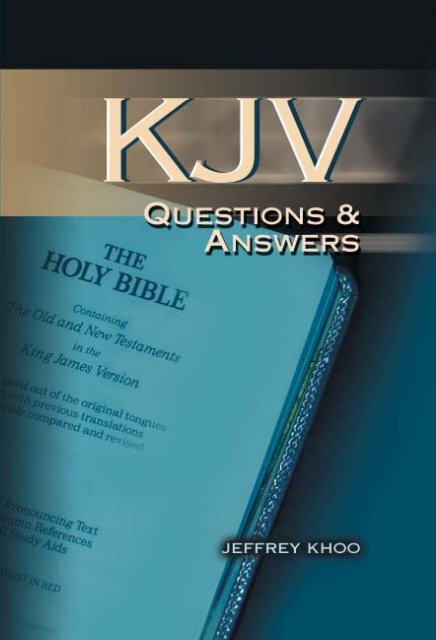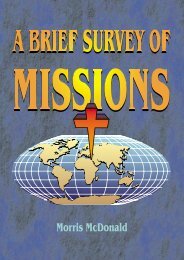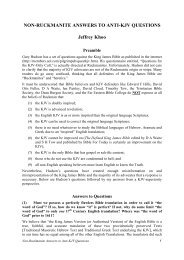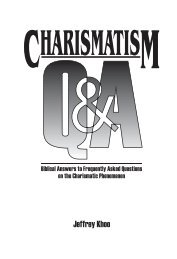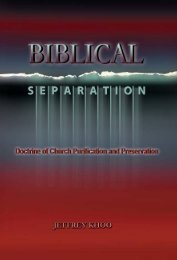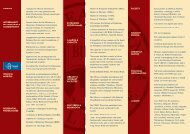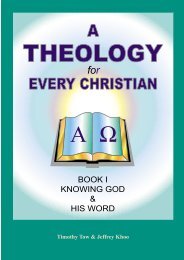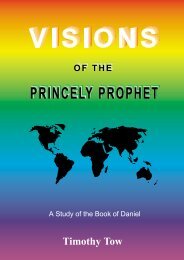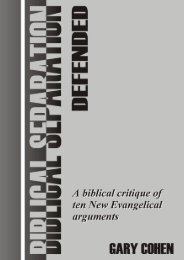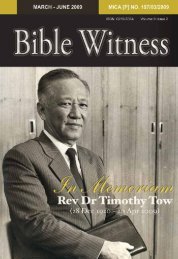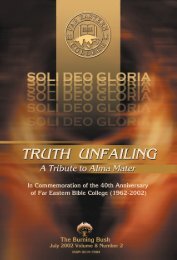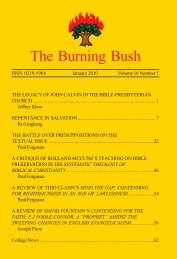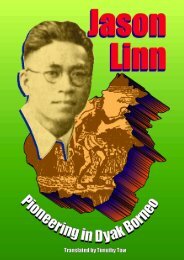KJV Questions and Answers - Far Eastern Bible College
KJV Questions and Answers - Far Eastern Bible College
KJV Questions and Answers - Far Eastern Bible College
- No tags were found...
You also want an ePaper? Increase the reach of your titles
YUMPU automatically turns print PDFs into web optimized ePapers that Google loves.
<strong>KJV</strong> Q&A: <strong>Answers</strong> to Frequently Asked <strong>Questions</strong> About the <strong>KJV</strong><strong>and</strong> its Underlying Texts© 2003 by Jeffrey KhooPublisher:<strong>Bible</strong> Witness Literature Ministry, P O Box 369, Singapore 914013Website: www.biblewitness.comCredits:Cover: Melissa NeoAppendix: Paul CheongISBN: 981-04-8573-52 <strong>KJV</strong> Q&A
CONTENTSPREFACE: REVISIONISM ANCIENT AND MODERN.............. 4CHAPTERSI PREAMBLE ............................................................................ 6II QUESTIONS ABOUT THE KING JAMES VERSION ......... 8IIIQUESTIONS ABOUT THE INSPIRATION ANDPRESERVATION OF SCRIPTURE ...................................... 20IVQUESTIONS ABOUT FOREIGN LANGUAGE BIBLESAND THE MODERN VERSIONS ....................................... 39V QUESTIONS ABOUT DIFFICULT VERSES ...................... 44APPENDIX: UNDERSTANDING <strong>KJV</strong> ENGLISH ..................... 503
PREFACEREVISIONISM ANCIENT AND MODERNS H TowGod had spoken: His Word st<strong>and</strong>eth sure, forever settled, inerrant,infallible, perfect. Who dare doubt or question it but the father of lies <strong>and</strong>enemy of truth. His master stroke “Yea, hath God said?” stumbled ourfirst parents <strong>and</strong> plunged the race into sorrow <strong>and</strong> curse.That was revisionism of the spoken word at the dawn of history.In time God gave the Written Word: holy men of God wrote as theywere moved by the Holy Ghost. That Word was denied to God’s peopleby unfaithful custodians, until God sent the Reformation <strong>and</strong> the <strong>Bible</strong> ofthe Reformation—the King James Version (<strong>KJV</strong>)—to lift the darkness ofa thous<strong>and</strong> years.Lovers <strong>and</strong> defenders of the <strong>KJV</strong> affirm with Dean Burgon ofOxford thatThe <strong>Bible</strong> is none other than the voice of Him that sitteth upon the throne.Every book of it, every chapter of it, every verse of it, every syllable of it,every letter of it, is direct utterance of the Most High. The <strong>Bible</strong> is noneother than the Word of God, not some part of it more, some part of it less,but all alike the utterance of Him that sitteth upon the throne, faultless,unerring, supreme.Through three centuries, the <strong>KJV</strong> reigned supreme, the unchallenged<strong>and</strong> unrivalled Word of God. But the enemy of truth, with diabolicalcunning <strong>and</strong> subtlety, schemed its overthrow through a “Committee ofRevision” headed by Westcott <strong>and</strong> Hort, masterminds of subversion <strong>and</strong>champions of corrupted <strong>and</strong> doctored texts.Their “Revised Version” of 1881, a masterpiece of intrigue, <strong>and</strong>“secret weapon” of the Counter-Reformation, breached the dike of HolyScripture, <strong>and</strong> a hundred corrupt “Modern English Versions” poured4 <strong>KJV</strong> Q&A
through the floodgate of Revisionism. In the century following, corruptversions had all but replaced the King James <strong>Bible</strong>.Thank God, it was all but: He has yet a valiant remnant who st<strong>and</strong>against the tide of corrupt English Versions, like the faithful seventhous<strong>and</strong> in Israel (1 Kgs 19:18), their knees have not bowed before theBaal of Modern Revisionism.This Twenty-first Century “Battle of the Versions” intensifies as thefather of lies uses every wily stratagem to overthrow the citadel ofBiblical fundamentalism, hurling false accusations against the belovedtranslation <strong>and</strong> the underlying texts.But we affirm our unshakable faith in the <strong>KJV</strong> as the very Word ofGod—the best, most faithful, most accurate, most beautiful translation ofthe <strong>Bible</strong> in the English language that is based on God’s infallible,inerrant, inspired <strong>and</strong> preserved texts.May all who love the Word of God affirm with the Scripture, that“the law of the LORD is perfect, converting the soul: the testimony of theLORD is sure, making wise the simple” (Ps 19:7), <strong>and</strong> that “All scriptureis given by inspiration of God, <strong>and</strong> is profitable for doctrine, for reproof,for correction, for instruction in righteousness: That the man of God maybe perfect, throughly furnished unto all good works” (2 Tim 3:16, 17).Let God be true but every man a liar. God’s Word is truth. Only the<strong>KJV</strong> <strong>and</strong> its underlying texts preserve that truth perfectly.Dr S H Tow is the author of Beyond Versions (see page 38), <strong>and</strong>the contributing editor of The Defined King James <strong>Bible</strong>. He sitson the advisory council of the Dean Burgon Society, USA, <strong>and</strong>serves as the senior pastor of Calvary <strong>Bible</strong>-Presbyterian Church,Singapore.REVISIONISM ANCIENT AND MODERN5
CHAPTER IPREAMBLEA Personal Affirmation of the 100% Inspiration <strong>and</strong> the 100%Preservation of the Original Language ScripturesUnderlying the King James Version(1) I do believe in the divine, verbal <strong>and</strong> plenary inspiration of theScriptures in the original languages, their consequent inerrancy <strong>and</strong>infallibility, <strong>and</strong> as the Word of God, the Supreme <strong>and</strong> final authorityin faith <strong>and</strong> life.(2) I do affirm the biblical doctrine of providential preservation that theinspired words of the Hebrew OT Scriptures <strong>and</strong> the Greek NTScriptures are “kept pure in all ages” as taught by the WestminsterConfession.(3) I do believe that the Texts which are purest <strong>and</strong> closest to theautographs of the <strong>Bible</strong> are the Traditional Masoretic Hebrew Textof the Old Testament, <strong>and</strong> the Traditional Greek Text for the NewTestament underlying the King James Version.(4) I believe that the purity of God’s words has been faithfullymaintained in the Traditional/Byzantine/Majority/Received Text,<strong>and</strong> fully represented in the Textus Receptus that underlies the <strong>KJV</strong>.Providential preservation is not static but dynamic.(5) I do believe that God’s providential preservation of the Scripturesconcerns not just the doctrines but also the very words of Scriptureto the jot <strong>and</strong> tittle (Ps 12:6-7, Matt 5:18, 24:35, Mark 13:31, Luke21:33, Rev 22:18-19).(6) I do not deny that other faithful <strong>Bible</strong> translations, including foreignlanguage ones, that are based on other editions of the TextusReceptus can be deemed the Word of God.6 <strong>KJV</strong> Q&A
(7) I do believe that Scripture cannot contradict Scripture, <strong>and</strong> hencethere can be no discrepancies in the <strong>Bible</strong>. All alleged discrepanciesare only apparent <strong>and</strong> not actual. Principles of harmonisation shouldbe employed to offer possible solutions, but calling suchdiscrepancies “scribal errors” is not one.(8) I do not believe we need to improve on the TR underlying the <strong>KJV</strong>. Ido not want to play textual critic, <strong>and</strong> be a judge of God’s Word. Iaccept God’s special h<strong>and</strong> in His providential work of <strong>Bible</strong>preservation during the Reformation.“But sanctify the Lord God in your hearts: <strong>and</strong> be ready always togive an answer to every man that asketh you a reason of the hopethat is in you with meekness <strong>and</strong> fear” (1 Pet 3:15).ISBN 981-04-5021-4 Price: $6.00FEBC BookroomTel: (65)6254-9188, Fax: (65)6251-3891Email: febcbkrm@singnet.com.sgKEPT PURE IN ALL AGESby Jeffrey KhooThere is a battle to be fought today. Itis a battle for the <strong>Bible</strong>. The battle inthe last century concerned thedoctrine of <strong>Bible</strong> inspiration. In thisnew century, the battle concerns thedoctrine of <strong>Bible</strong> preservation. Thedoctrine of inspiration is meaninglesswithout the doctrine of preservation.The same God who inspired His Wordhas promised to preserve His Word.The Westminister Confession affirmsthe twin doctrines of <strong>Bible</strong> inspiration<strong>and</strong> <strong>Bible</strong> preservation: “The OldTestament in Hebrew (which was thenative language of the people of Godof old), <strong>and</strong> the New Testament inGreek (which, at the time of the writingof it, was most generally known to thenations), being immediately inspiredby God, <strong>and</strong>, by his singular care <strong>and</strong>providence, kept pure in all ages, aretherefore authentical.”PREAMBLE7
CHAPTER IIQUESTIONS ABOUT THE KING JAMES VERSION(1) Is the <strong>KJV</strong> “the Word of God”?The King James Version (<strong>KJV</strong>) is the best English translation of theScriptures, made by godly translators from uncorrupted Hebrew <strong>and</strong>Greek texts. Among all English <strong>Bible</strong>s today there is none that cansurpass the <strong>KJV</strong>. Indeed the <strong>KJV</strong> is the very Word of God, <strong>and</strong> fullyreliable. Thus it should be used exclusively not only for public ministrybut also private study. [See transmission chart on the next page.](2) Is the <strong>KJV</strong> “inspired”?God “inspired” or “breathed out” (theopneustos, 2 Tim 3:16) Hiswords in Hebrew, Aramaic <strong>and</strong> Greek. Strictly speaking, the divinelyinspired words were the Hebrew, Aramaic <strong>and</strong> Greek words God gave toHis writers. The <strong>KJV</strong>, since it is a faithful <strong>and</strong> accurate translation ofGod’s Word, can be regarded as “inspired” or “Scripture,” but only in aderived sense. Dr Timothy Tow says, “The original text may be likened toginseng, <strong>and</strong> its translation ginseng tea.”(3) Is the <strong>KJV</strong> as good as the original language Scriptures?No <strong>Bible</strong> translation is 100% equivalent to the inspired Hebrew/Aramaic <strong>and</strong> Greek Scriptures. No translated words can be better than theinspired Hebrew/Aramaic <strong>and</strong> Greek words. When using the <strong>KJV</strong>, it isnecessary to go back to the original language Scriptures for clarity <strong>and</strong>fulness of meaning.By way of illustration, the original language Scripture underlyingthe <strong>KJV</strong> is like the perfect platinum yardstick of the SmithsonianInstitute, inerrant, infallible, authoritative. The <strong>KJV</strong> <strong>and</strong> other accurate<strong>and</strong> reliable translations are like the common yardstick, though not 100%are good <strong>and</strong> safe enough for use. Although there may be a need toconsult the underlying Hebrew <strong>and</strong> Greek texts especially when8 <strong>KJV</strong> Q&A
NEW TESTAMENT GREEK TEXTAUTOGRAPHSCORRUPTED(“ALEXANDRIAN TEXT”)APOGRAPHSPRESERVED(“BYZANTINE TEXT”)CodexSinaiticusCodexVaticanusMINORITY TEXTth(Rejected by end of 4 Century)MAJORITY TEXT(Acknowledged & copied faithfully)Discovered in 1860sPromoted byWESTCOTT & HORTTEXTUS RECEPTUSErasmus’ TR (1516-35)Stephanus’ TR (1546-51)Beza’s TR (1565-98)W-H TEXT(1881)ERV(1881-85)NESTLE-ALANDGREEK NTUNITED BIBLESOCIETIES’GREEK NTASV(1901) Modern EnglishVersions(NIV, RSV,TEV, NASB,ESV, etc)<strong>KJV</strong> TR(1604-11)<strong>KJV</strong> (1611)st1 major editing(1617-29)nd2 major editing(1762-69)Defended byDEAN BURGONScrivener’s TR(1894)Tyndale(1525)Coverdale(1535)Matthew(1537)Great(1539)Geneva(1560)Bishops(1568)GERMANLuther’s <strong>Bible</strong>(1522)SPANISHReina-Valera(1569-1602)POLISHBiblia Gdanska(1632)Elzevir’s TR(1624-33)FRENCHMartin <strong>Bible</strong>(1701)THE MANY BIBLES OF ECUMENISM,MODERNISM, NEO-EVANGELICALISM& NEO-FUNDAMENTALISMTHE ONE BIBLE OF HISTORIC OR REFORMEDFUNDAMENTALISMQUESTIONS ABOUT THE KING JAMES VERSION9
interpreting difficult verses, we do not believe that the King Jamestranslators were in any way careless in translating their <strong>Bible</strong>. The samehowever cannot be said of the modern versions—they are definitelyshorter by many inches <strong>and</strong> far too unreliable.(4) Are there grammatical or spelling mistakes in the <strong>KJV</strong>?Many anti-<strong>KJV</strong>ists are conceited enough to think that their comm<strong>and</strong>of the English language is superior to that of the King James translators.They want to correct the King’s English of the <strong>KJV</strong>. They are likekindergarten pupils trying to correct the university professors. The <strong>KJV</strong>was written in an age when the English language was at its zenith. DavidMarshall—Singapore’s first chief minister—who had for his Englishtextbook the King James <strong>Bible</strong> would have dismissed the many puerilecriticisms of the English of the <strong>KJV</strong>.Other so-called “mistakes” anti-<strong>KJV</strong>ists point out like archaicspellings <strong>and</strong> capitalisations etc, are not “mistakes.” The King Jamestranslators capitalise the initial letters of certain nouns <strong>and</strong> adjectiveswhen these nouns <strong>and</strong> adjectives refer to God. In certain places they donot because it could be due to their uncertainty on how the noun/adjectiveis to be interpreted, or simply because it was an oversight on their part(they were not infallible as translators <strong>and</strong> proofreaders). At times there isa need to return to the Hebrew <strong>and</strong> Greek Scriptures for certainty <strong>and</strong>clarity. Dr E F Hills has this wise advice, “We must be very cautioustherefore about finding errors in the text of the King James Version, <strong>and</strong>the same holds true also in the realm of translation. Whenever therenderings of the King James Version are called in question, it is usuallythe accuser that finds himself in the wrong.”(5) Are the archaisms in the <strong>KJV</strong> a good reason to replace itwith the modern versions?No, it is not a good reason. The claim that the <strong>KJV</strong> has “many”archaic words <strong>and</strong> therefore not underst<strong>and</strong>able is overstated. There areonly about 200 archaic words in the <strong>KJV</strong>. These old words comprise only0.1% of the <strong>KJV</strong>. The Oxford, Webster, Chambers dictionaries containentries for most of these archaic words. The Defined King James <strong>Bible</strong>published by The <strong>Bible</strong> For Today Press has the meanings of all thearchaic words footnoted. Other sources of help are the “<strong>Bible</strong> Word List”published by the Trinitarian <strong>Bible</strong> Society, <strong>and</strong> the Concise King James10 <strong>KJV</strong> Q&A
<strong>Bible</strong> Dictionary by David Cloud. [See Appendix: Underst<strong>and</strong>ing <strong>KJV</strong>English.](6) Where was “the Word of God” prior to the <strong>KJV</strong>?The Word of God is found in the divinely inspired <strong>and</strong>providentially preserved Traditional <strong>and</strong> Preserved Text of OT <strong>and</strong> NTScriptures used <strong>and</strong> recognised by the Church down through the ages, <strong>and</strong>in all the faithful <strong>and</strong> reliable translations that were based on those Texts,viz. Martin Luther’s German <strong>Bible</strong> (1522), William Tyndale’s <strong>Bible</strong>(1525), Myles Coverdale’s <strong>Bible</strong> (1535), The Matthew’s <strong>Bible</strong> (1537),The Great <strong>Bible</strong> (1539-41), <strong>and</strong> The Geneva <strong>Bible</strong> (1557-60).(7) Is the <strong>KJV</strong> better than the other English Reformation<strong>Bible</strong>s?The Protestant Reformation arose because of the <strong>Bible</strong>. SolaScriptura (Scripture Alone) was a vital Reformation slogan. All theseReformation <strong>Bible</strong>s—Wycliffe’s <strong>Bible</strong> (1382), Tyndale’s <strong>Bible</strong> (1525),Coverdale’s <strong>Bible</strong> (1535), Matthew’s <strong>Bible</strong> (1537), the Great <strong>Bible</strong>(1539), the Geneva <strong>Bible</strong> (1560), <strong>and</strong> the Bishops’ <strong>Bible</strong> (1568)—facilitated the Reformation cause, <strong>and</strong> were faithful precursors to theKing James <strong>Bible</strong>.It must be categorically stated that all the English <strong>Bible</strong>s of theReformation were indeed good <strong>and</strong> faithful <strong>Bible</strong>s, but the <strong>KJV</strong> was thebest among them. It is significant to note that prior to the <strong>KJV</strong>, theEnglish translations were largely individual efforts. The <strong>KJV</strong>, on the otherh<strong>and</strong>, was a corporate work. In the words of the translators, the <strong>KJV</strong> wasnot produced “to make a bad one a good one; but to make a good onebetter, or out of many good ones one principal good one.” For thispurpose <strong>and</strong> with such devotion the <strong>KJV</strong> translation committee wasformed, <strong>and</strong> they were careful to “assemble together; not too many, lestone should trouble another; <strong>and</strong> yet many, lest many things haply mightescape them.”It is important to know that God holds His people in every ageresponsible for using the divinely inspired <strong>and</strong> preserved original texts<strong>and</strong> only the faithful <strong>and</strong> accurate translations of His Word. The Pro-<strong>KJV</strong>position does not limit the Word of God to only one 17 th Century Englishtranslation, but advocates that the <strong>KJV</strong>, being still the most accurateEnglish translation based on the purest texts, should be the only <strong>Bible</strong>QUESTIONS ABOUT THE KING JAMES VERSION11
used by English-speaking Christians today. To use other <strong>Bible</strong>s when thebest is clearly available would be to neglect our responsibility.(8) What did the <strong>KJV</strong> translators mean when they said that“the meanest translation” is still “the Word of God”?The 1611 Preface of the <strong>KJV</strong> is often used by anti-<strong>KJV</strong>ists tosupport the corrupt modern versions. They argue that in that Preface the<strong>KJV</strong> translators themselves viewed even the worst English versions as theWord of God.Did the <strong>KJV</strong> translators really say that every translation of the <strong>Bible</strong>even if filled with grammatical, translational, or doctrinal errors could berightly called the Word of God? They certainly did not. The context inwhich they wrote those words clearly reveals this: “Now to the latter weanswer, that we do not deny, nay, we affirm <strong>and</strong> avow, that the verymeanest translation of the <strong>Bible</strong> in English set forth by men of ourprofession (for we have seen none of theirs of the whole <strong>Bible</strong> as yet)containeth the word of God, nay, is the word of God: as the King’s speechwhich he uttered in parliament, being translated into French, Dutch,Italian, <strong>and</strong> Latin, is still the King’s speech, though it be not interpretedby every translator with the like grace.”It is clear that by the word “meanest” they do not mean “worst” (i.e.“evil in the highest degree”). Who would dare mistranslate the king’sspeech? Clearly they were not talking about sense but style. By “meanest”they meant poor in literary grace. When beginning Greek studentstranslate their Greek <strong>Bible</strong> into English, it may be rough <strong>and</strong> wooden; butif literal <strong>and</strong> precise, it is the Word of God. The <strong>KJV</strong> translators, some ofwhom were Puritans, certainly did not humour wicked or corruptversions. It is utterly ridiculous <strong>and</strong> absurd to suggest that they did.Anti-<strong>KJV</strong>ists have thus put words into the mouths of the King Jamestranslators to make them mean what they did not mean by “meanest” in amean attempt to demean the Pro-<strong>KJV</strong> position.(9) Who is Peter Ruckman <strong>and</strong> what is his view on the <strong>KJV</strong>?Peter Ruckman earned his PhD from Bob Jones University. He holdsto the view that the <strong>KJV</strong> is separately inspired of God, contains advancedrevelation, <strong>and</strong> thus superior to the original Hebrew <strong>and</strong> GreekScriptures. Ruckman’s position is erroneous, even heretical becauseinspiration in the light of 2 Tim 3:16, <strong>and</strong> 2 Pet 1:21 is applicable only to12 <strong>KJV</strong> Q&A
the original writers (OT Prophets <strong>and</strong> NT Apostles), original writings (66books of canonical Scripture), <strong>and</strong> original languages (Hebrew, Aramaic<strong>and</strong> Greek).(10) Did the <strong>KJV</strong> translators claim to be inspired of God intheir work?The <strong>KJV</strong> translators did not claim to be inspired by God in theirtranslation work, <strong>and</strong> rightly so because truly they were not. Only theBiblical writers (e.g. Moses, David, Matthew, Paul etc) were inspired ofGod to write the Scriptures. Nevertheless, it must be observed that theKing James translators recognised with deep reverence that the sacredtexts from which they were translating were the inspired Word of God.This is why they ardently desired to make their translation as accurate aspossible despite their own shortcomings <strong>and</strong> imperfections. In contrast tothis, not all who are involved in modern <strong>Bible</strong> translation work todayhave such a high regard for the texts they translate, as evidenced from thebold liberties they are willing to take with the text.(11) How many revisions did the <strong>KJV</strong> undergo?After the <strong>KJV</strong> was published in 1611, it went through a number ofrevisions, all of which were completed by 1629. The revisions thatoccurred between 1611 <strong>and</strong> 1638 were due to printing errors. The <strong>KJV</strong>translators themselves, namely, Samuel Ward <strong>and</strong> John Bois, correctedthese errors. In the course of typesetting, the printers had inadvertentlyleft out words or phrases; all such manifest typographical errors had beencorrected. For example, Ps 69:32 of the 1611 edition read “good” insteadof “God.” This was clearly a printer’s error, <strong>and</strong> was corrected in 1617.Apart from a slight revision in 1638, there followed several facetiousattempts to revise the <strong>KJV</strong> between 1638-1762 but none were successful.The final revision of the <strong>KJV</strong> was done between 1762 <strong>and</strong> 1769. The1762 revision had to do with spelling. For example, old forms that had an“e” after verbs, <strong>and</strong> “u” instead of “v,” <strong>and</strong> “f” for “s” were allst<strong>and</strong>ardised to conform to modern spelling. For example, “feare” is“fear,” “mooued” is “moved,” <strong>and</strong> “euill” is “evil,” <strong>and</strong> “alfo,” is “also.”All these Gothic <strong>and</strong> German spelling peculiarities have been Romanised.1769 saw an updating of weights, measures, <strong>and</strong> coins. This 1769 editionof the <strong>KJV</strong> is the one popularly in print today. It is important to note thatthe 1769 edition is essentially the same as the 1611.QUESTIONS ABOUT THE KING JAMES VERSION13
There was an 1805 edition which accidentally printed aproofreader’s note “to remain” in the text of Gal 4:29 that made the verseto read “him that was born after the Spirit to remain …”. The onlysignificant revision in the 1800s was in 1873 when Scrivener worked onthe <strong>KJV</strong>’s marginal notes, orthography, <strong>and</strong> cross references.There are not two or more <strong>KJV</strong>s but only one, <strong>and</strong> the one that isused today is basically the 1769 edition.(12) Why did the <strong>KJV</strong> translators translate the Apocrypha<strong>and</strong> include these books in the original 1611 edition?It must be stated that the <strong>KJV</strong> translators in no wise considered theApocrypha to be inspired Scripture. The Westminster Confession of Faith(1643-8) which was written not long after the <strong>KJV</strong> was translated statesthat the Apocrypha was clearly not recognised by God’s people to be partof the Word of God. It is also important to note that it was not only the<strong>KJV</strong> that contained the Apocrypha but also other Reformation <strong>Bible</strong>s likethe Wycliffe <strong>and</strong> Geneva <strong>Bible</strong>s. It was only in 1640 that the Geneva<strong>Bible</strong> omitted the Apocrypha, <strong>and</strong> it was not until the 19 th century that theremoval of the Apocrypha from all Protestant <strong>Bible</strong>s became the norm.It must be noted that the King James translators did not care verymuch for the Apocrypha, <strong>and</strong> translated it rather carelessly. Scrivenerwrote, “It is well known to Biblical scholars that the Apocrypha receivedvery inadequate attention from the revisers of 1611 <strong>and</strong> theirpredecessors, so that whole passages remain unaltered from the racy,spirited, rhythmical, but hasty, loose <strong>and</strong> most inaccurate version … madeby Coverdale for the <strong>Bible</strong> of 1536.”(13) Was King James a homosexual?There are those who say that King James was a homosexual, <strong>and</strong>there are those who think not (recently, a heavily documented 392-pagebook by Stephen A Coston Sr, King James the VI of Scotl<strong>and</strong> <strong>and</strong> the I ofEngl<strong>and</strong>: Unjustly Accused? [St Petersburg: KoenigsWort Incorporated,1996], takes the latter view). But for argument’s sake, let us say KingJames was homosexual. Being homosexual he would surely alterscriptural texts that speak against the sin of homosexuality. We do notfind such alterations in the <strong>KJV</strong>. On the contrary, we find intact suchpassages as Rom 1:26-27 speaking out against “vile affections: for eventheir women did change the natural use into that which is against nature:14 <strong>KJV</strong> Q&A
And likewise also the men, leaving the natural use of the woman, burnedin their lust one toward another; men with men working that which isunseemly, <strong>and</strong> receiving in themselves that recompence of their errorwhich was meet.” If King James were truly homosexual, he would beexpected to alter or delete this passage. There was no such tampering. Inany case, even if King James was homosexual, he was not among thetranslators, <strong>and</strong> had no part in the translating work.(14) Were the King James translators infallible?No sinful human being is infallible. Only God is infallible. Even theinspired writers of the Scriptures were not perfect men. For example,David committed adultery <strong>and</strong> yet God used him to write the Psalms.Peter denied Christ three times <strong>and</strong> yet wrote 1-2 Peter. The King Jamestranslators were likewise sinners saved by the grace of God. There is noreason to doubt that the men who translated the <strong>KJV</strong>, like the biblicalwriters, were regenerate men of piety, godliness <strong>and</strong> erudite scholarship,their weaknesses <strong>and</strong> failings of the flesh notwithst<strong>and</strong>ing. If they werealive today, they would probably on hindsight praise the Lord for theglorious work that He had done through them in producing such a faithful<strong>and</strong> accurate translation that has stood the test of time, <strong>and</strong> blessed somany millions of God’s people all over the world.(15) Who owns the copyright to the <strong>KJV</strong>?The British Crown owns the copyright to the <strong>KJV</strong>, <strong>and</strong> hence theright to grant permission to publish it to whomever she wishes. However,it does seem that the Crown does not care too much to enforce hercopyright. The <strong>KJV</strong> is published today by not a few University Presses,<strong>Bible</strong> Societies, publishing houses, <strong>and</strong> software companies in Britain <strong>and</strong>America <strong>and</strong> elsewhere.(16) Are those who do not take the <strong>KJV</strong> st<strong>and</strong>, even if they arenot ignorant of the issue, heretics?What is a heresy? Biblically speaking, a heresy is any doctrine thatis contrary to the fundamental truths of the Christian faith, which seeks totear believers away from their Lord <strong>and</strong> Saviour by undermining theirconfidence in His person, work <strong>and</strong> words.We ought not be trigger-happy in calling a person a heretic. When Ithink of heretics, I think of Westcott <strong>and</strong> Hort. They called the <strong>KJV</strong>/TRQUESTIONS ABOUT THE KING JAMES VERSION15
“vile” <strong>and</strong> “villainous.” They do not believe in the doctrine of verbalplenary inspiration <strong>and</strong> preservation. They do not believe that the <strong>Bible</strong> istotally inerrant <strong>and</strong> infallible. So, in the same way <strong>Bible</strong>-Presbyterians areknown as fundamentalists because they are disciples of Carl McIntire, Iwould say the disciples of Westcott <strong>and</strong> Hort <strong>and</strong> those of their moulddeserve the same label their teachers have acquired.(17) Should we label those who are non-<strong>KJV</strong> “heretics”?No, I do not think so. Here we have the infallible example of ourLord. How did Jesus deal with heresy <strong>and</strong> the heretics of His day? Whenwe study the life of Christ, we find our Lord sparing no effort <strong>and</strong>mincing no words in denouncing the heretics of His time, namely, Israel’spastors <strong>and</strong> doctors of theology—the Pharisees, Scribes <strong>and</strong> Sadducees.Read Matt 23. The Lord cursed them with woes, <strong>and</strong> called themhypocrites, blind guides, fools, whited sepulchres, serpents <strong>and</strong> vipers.They were the pastors <strong>and</strong> teachers of Israel who instead of guiding God’speople into the straight <strong>and</strong> narrow way of life, led them into the broadway of death. Instead of shepherding God’s people to green pastures <strong>and</strong>still waters, they led them to poisoned fields of thistles <strong>and</strong> thorns. Jesuswas very angry with these false pastors <strong>and</strong> teachers, <strong>and</strong> said theydeserve “the greater damnation” (see also Jas 3:1).On the other h<strong>and</strong>, it is significant to note that Jesus was very kind,gentle, <strong>and</strong> patient with the common folk, the ordinary member of thepew, His lambs <strong>and</strong> sheep. He did not excuse them when they erred indoctrine, word or deed, but chided them gently, <strong>and</strong> patiently instructedthem on the right way. Jesus made a distinction between the shepherd <strong>and</strong>the sheep. He dealt with both differently. We should follow Jesus in thisregard. I have no sympathy for Westcott <strong>and</strong> Hort <strong>and</strong> their clericalcohorts; but to the ordinary member of the pew, God’s lambs <strong>and</strong> sheep,we must take care not only to feed them with the whole counsel of God,but also protect them from the wolves, <strong>and</strong> wolves in sheep’s clothing,viz. the heretical teachers who seek to devour <strong>and</strong> tear people away fromour Saviour <strong>and</strong> His Truth.In the pastoral ministry, I feel that it is very important that we bevery sensitive <strong>and</strong> careful not to undermine the believers’ confidence inGod <strong>and</strong> His Word. Jesus’ warning applies: “But whoso shall offend oneof these little ones which believe in me, it were better for him that a16 <strong>KJV</strong> Q&A
millstone were hanged about his neck, <strong>and</strong> that he were drowned in thedepth of the sea” (Matt 18:6).(18) Is it true that certain fundamentalist universities <strong>and</strong>seminaries are moving away from the <strong>KJV</strong> towards the modernversions, <strong>and</strong> denying the doctrine of special providentialpreservation of Scripture?It is sad but true that certain fundamentalist universities <strong>and</strong>seminaries are today undermining the good old <strong>KJV</strong> by saying that it hasmany translational mistakes, <strong>and</strong> denying that God has indeed preservedevery jot <strong>and</strong> tittle of His Word in the original language Scripturesunderlying the <strong>KJV</strong>. Generally speaking, these neo-fundamentalistinstitutions take the following views:(1) Inspiration Yes, Preservation No: They believe in the inspirationof Scripture in the autographs (i.e. the first writings), but not thepreservation of it in the apographs (i.e. subsequent copies). According tothem, one can only be sure that every vital doctrine in the <strong>Bible</strong> ispreserved, but not every inspired word (contra Matt 4:4, 5:18).(2) <strong>KJV</strong> Yes, TR No: They may use or allow the use of the <strong>KJV</strong> astheir classroom text, but their teachers generally undermine the PreservedHebrew Masoretic Text <strong>and</strong> Greek Textus Receptus on which the <strong>KJV</strong> isbased. They allow for the Westcott <strong>and</strong> Hort view that such preciouspassages as the last 12 verses of Mark, the woman taken in adultery (John7:53-8:11), <strong>and</strong> John’s Trinitarian statement (1 John 5:7-8) are not part ofinspired Scripture.(3) <strong>KJV</strong> Yes, Modern Versions Yes Too: They may adopt the <strong>KJV</strong> astheir classroom text, but they also approve of <strong>and</strong> recommend suchversions as the New International Version (NIV), New AmericanSt<strong>and</strong>ard <strong>Bible</strong> (NASB), <strong>and</strong> the English St<strong>and</strong>ard Version (ESV) whichare all based on the corrupt Westcott <strong>and</strong> Hort Text. [See chart on page24.](19) Which are the Reformed seminaries that uphold the<strong>KJV</strong>?Besides the <strong>Far</strong> <strong>Eastern</strong> <strong>Bible</strong> <strong>College</strong> (<strong>Bible</strong>-Presbyterian), there area number of Reformed seminaries that uphold the <strong>KJV</strong> <strong>and</strong> its underlyingtexts:QUESTIONS ABOUT THE KING JAMES VERSION17
Protestant Reformed Seminary (www.prca.org/seminary.html). TheRev David J Engelsma, Professor of Dogmatics <strong>and</strong> Old TestamentStudies at the Theological School of the Protestant Reformed Churcheswrote “Modern <strong>Bible</strong> Versions” to defend the <strong>KJV</strong> <strong>and</strong> warn against themodern versions of the <strong>Bible</strong> that are displacing the <strong>KJV</strong>. See it at http://www.prca.org/pamphlets/pamphlet_10.html.Puritan Reformed Theological Seminary (www.hnrc.org/gr/Ministries/PRTS/prts.html). Dr Joel R Beeke, the President of PRTS,wrote a tract entitled, “Practical Reasons for Retaining the <strong>KJV</strong>.” In it, hegave 13 reasons why the <strong>KJV</strong> should be preferred over against themodern versions of the English <strong>Bible</strong>. He argued, “Based on the TextusReceptus (Greek NT), <strong>and</strong> the Masoretic Text (Hebrew OT), the <strong>KJV</strong>gives the most authentic <strong>and</strong> fullest available text of the Scriptures, withnone of the many omissions <strong>and</strong> textual rewrites of the moderntranslations.” He also said, “In choosing this version we choose to st<strong>and</strong>with all that is best in the great tradition of historic Christianity.”London Reformed Baptist Seminary (www.metropolitantabernacle.org). Dr Peter Masters, the pastor of Spurgeon’s Tabernacle, uses the <strong>KJV</strong>in his church <strong>and</strong> seminary, <strong>and</strong> promotes the books of D A Waite <strong>and</strong>David Cloud in his bookstore. Dr Masters says that the <strong>KJV</strong> is preferredbecause it encourages the “reverent tense” in prayer.European Institute of Protestant Studies (www.ianpaisley.org). TheRev Dr Ian R K Paisley, MP, MEP, Moderator of the Free PresbyterianChurch of Ulster, Minister of Martyrs’ Memorial Free PresbyterianChurch, <strong>and</strong> President of EIPS, has written a passionate defence of the<strong>KJV</strong> entitled, A Plea for the Old Sword (Belfast: Ambassador, 1997).Highly recommended, especially for the laity.<strong>Bible</strong> <strong>College</strong> of East Africa, P O Box 41140, Nairobi, Kenya.BCEA is a missions outreach of the Independent Board for PresbyterianForeign Missions (<strong>Bible</strong> Presbyterian), USA. The <strong>College</strong> principal is theRev Dr Mark Kyung Soo Kim, a graduate of <strong>Far</strong> <strong>Eastern</strong> <strong>Bible</strong> <strong>College</strong><strong>and</strong> of Pensacola Christian <strong>College</strong>.<strong>Far</strong> <strong>Eastern</strong> Fundamental School of Theology, 6D Nanthani Street,Sawbwakyigone, Insein, Yangon, Myanmar. FEFST is the denominationalschool of the Evangelical Presbyterian Church of Myanmar (EPCM). TheRev Robert Thawm Luai who heads the school has published the Falam-Chin <strong>Bible</strong> which is based on the <strong>KJV</strong>. The <strong>Bible</strong> is beautifully printed18 <strong>KJV</strong> Q&A
from its very own Heidelberg Printing Press. You may read more about itat http://www.lifefebc.com/febc/BurnBush/V7N2.htm.Although not Reformed or Presbyterian, Pensacola Christian<strong>College</strong> <strong>and</strong> Theological Seminary (www.pts.pcci.edu) deserves specialmention. PCC/PTS has come up very strongly against fundamentalcolleges <strong>and</strong> seminaries that either merely pay lip service to the <strong>KJV</strong>, orundermine it altogether by rejecting the traditional text in favour of themodern but corrupt critical text. Get a hold of these three excellent videolectures on the <strong>KJV</strong> issue by Dr Dell Johnson, Dr Theodore Letis, <strong>and</strong> DrMichael Bates: (1) “The Leaven in Fundamentalism,” (2) “The <strong>Bible</strong> …The Text is the Issue,” <strong>and</strong> (3) “The <strong>Bible</strong> Preserved … from Satan’sAttacks.”For a list of dispensational <strong>and</strong> Baptist colleges <strong>and</strong> seminaries thatdefend the <strong>KJV</strong>, please go to http://www.wholesomewords.org/direc.html.QUESTIONS ABOUT THE KING JAMES VERSION19
CHAPTER IIIQUESTIONS ABOUT THE INSPIRATION ANDPRESERVATION OF SCRIPTURE(20) Are only the autographs (the very first scripts) absolutelyinfallible <strong>and</strong> inerrant, or may the apographs (subsequentcopies) be considered infallible <strong>and</strong> inerrant as well?Most modern evangelical <strong>and</strong> fundamentalist scholars havemistakenly followed B B Warfield to say that only the original autographswere absolutely infallible <strong>and</strong> inerrant. Today, many scholars arequestioning this idea. Prof Richard Muller of Calvin TheologicalSeminary, for instance, rightly observed, “The Protestant scholastics donot press the point made by their nineteenth-century followers that theinfallibility of Scripture <strong>and</strong> the freedom of Scripture from error resideabsolutely in the autographa <strong>and</strong> only in a derivative sense in theapographa; rather, the scholastics argue positively that the apographapreserve intact the true words of the prophets <strong>and</strong> the apostles <strong>and</strong> that theGod-breathed (theopneustos) character of Scripture is manifest in theapographa as well as the autographa. In other words, the issue primarilyaddressed by the seventeenth-century orthodox in their discussion of theautographa is the continuity of the extant copies in Hebrew <strong>and</strong> in Greekwith the originals both quoad res, with respect to the thing or subject ofthe text, <strong>and</strong> quoad verba, with respect to the words of the text”(Dictionary of Latin <strong>and</strong> Greek Theological Terms, s.v. “autographa”).This is because the Scriptures expressly teach that the inspired autographsare providentially preserved in the apographs. [See chart “Inspiration<strong>and</strong> Preservation of Scripture: Four Views” on the next page.](21) Are there biblical evidences to prove that the apographsmay be considered the infallible <strong>and</strong> inerrant Word of God?The answer is yes. Consider the following biblical examples: (a) Bythe time the prophets of the OT stated things like “the word of our God20 <strong>KJV</strong> Q&A
21VIEWSFOURSCRIPTURE:OFPRESERVATIONANDINSPIRATIONMODERNISMNEO-EVANGELICALISMNEO-FUNDAMENTALISMFUNDAMENTALISMINSPIRATIONIBLICALBninspiratiooNninspiratioartialPninspiratiootalTninspiratioTotalBIBLICALPRESERVATIONpreservationoNnpreservatioartialPnpreservatioartialPnpreservatioTotalINFALLIBILITYBIBLICALINERRANCYANDinfallibilitybothDeniesininerrancy<strong>and</strong><strong>and</strong>autographsapographsbutinfallibilityAffirmstheininerrancydenies<strong>and</strong>autographsapographsinfallibilitytotalAffirmsinbutinerrancy<strong>and</strong>onlyautographstheinfallibilitytotalAffirmsbothininerrancy<strong>and</strong><strong>and</strong>autographstheapographsAUTHORITY ANDEPISTEMOLOGYalone.ScienceisFaith,notIntellect,toSeesupreme.believe.<strong>Bible</strong>.plusSciencemoresubjectedFaiththetothanIntellecttobelieve.toSee<strong>Bible</strong>.<strong>Bible</strong>.plusSciencemoresubjectedFaiththetothanIntellecttobelieve.toSee<strong>Bible</strong>.(aloneibleBaSolcriptura).SdanFaithtotallyIntellect<strong>Bible</strong>.thetosubjectedsee.toBelieveCRITICISMTEXTUAL<strong>and</strong>WestcotttoYesHort<strong>and</strong>WestcotttoYesHort<strong>and</strong>WestcotttoYesHort<strong>and</strong>WestcotttoNoHortTEXTGREEKORIGINALCritical<strong>and</strong>MinorityonlyTextCritical<strong>and</strong>MinorityonlyTextCritical<strong>and</strong>MinoritymainlyText<strong>and</strong>TextMajorityonlyReceptusTextusBIBLEENGLISHVERSIONSversionsmodernOnlyacceptableversionsmodernOnlyacceptableacceptableversionsllAeacceptabl<strong>KJV</strong>OnlyQUESTIONS ABOUT INSPIRATION AND PRESERVATION
shall st<strong>and</strong> for ever” (Isa 40:8), the original autographs were no longerexisting <strong>and</strong> the Word of God was found only in the manuscript copiesmany generations removed from the autographs. The same can be said ofthe time when Jesus said, “the scripture cannot be broken” (John 10:35).(b) By the time Paul wrote to Timothy, “All scripture is given byinspiration of God, <strong>and</strong> is profitable for doctrine, for reproof, forcorrection, for instruction in righteousness …” (2 Tim 3:16), the“scripture” that is mentioned here, especially the OT <strong>and</strong> perhaps someearlier books of the NT, were no longer the autographs. These wordsimply that infallibility <strong>and</strong> inerrancy are applicable not only to theoriginally given autographs, but even to faithfully copied apographs.Although there were occasional copying mistakes in the transmissionprocess, God providentially ensured that the majority of the copies reflectthe original readings. These copying mistakes were also graduallycorrected as they were spotted, <strong>and</strong> eventually removed at the time of thegreat Protestant Reformation from the Traditional Hebrew Masoretic Text<strong>and</strong> the Greek Textus Receptus underlying the <strong>KJV</strong>. That is why we say,“We believe in the divine, verbal, plenary inspiration of the Scriptures inthe original languages, their consequent inerrancy <strong>and</strong> infallibility, <strong>and</strong> asthe Word of God, the Supreme <strong>and</strong> final authority in faith <strong>and</strong> life.”(22) Did God lose any of His inspired New Testament wordswhen the autographs were destroyed?No, God did not lose any of the words of the originals when theautographs were destroyed. Although we do not have the autographstoday, we have the apographs which reflect the autographs. All thedivinely inspired words of the autographs have been providentiallypreserved in faithfully copied apographs. We affirm with the Westminsterdivines that the original language Scriptures “being immediately inspiredby God, <strong>and</strong>, by His singular care <strong>and</strong> providence, kept pure in all ages,are therefore authentical” (Westminster Confession of Faith, 1:8).Providentially speaking, the NT Autographs were neither “lost” nor“destroyed.” The purity of God’s Word has been faithfully maintainedthroughout the whole transmission of the Traditional/Byzantine/MajorityText, <strong>and</strong> fully represented in the Textus Receptus underlying the <strong>KJV</strong>.17 th century Calvinist theologian—Francis Turretin—himself affirmed:“By the original texts, we do not mean the autographs written by the h<strong>and</strong>of Moses, of the prophets <strong>and</strong> of the apostles, which certainly do not now22 <strong>KJV</strong> Q&A
exist. We mean their apographs which are so called because they set forthto us the word of God in the very words of those who wrote under theimmediate inspiration of the Holy Spirit.” Turretin was no ordinarytheologian. His Systematic Theology textbook was used in PrincetonSeminary until Warfield came into the scene with his new <strong>and</strong> radical“autographal” view of the original text which opened the door to liberaltextual criticism that has spawned a whole new generation of critical texts<strong>and</strong> modern perversions of the Scriptures that seek to displace the timetested<strong>and</strong> time-honoured TR <strong>and</strong> <strong>KJV</strong>. [See chart “The Entrance of theLeaven of Textual Criticism into Fundamentalism” on the next page.](23) What does the Westminster Confession of Faith mean bythe words, “kept pure in all ages”?Here is an answer from Prof William F Orr of PittsburghTheological Seminary: “this affirms that the Hebrew text of the OldTestament <strong>and</strong> the Greek of the New which was known to theWestminster divines was immediately inspired by God because it wasidentical with the first text that God had kept pure in all the ages. Theidea that there are mistakes in the Hebrew Masoretic texts or in the TextusReceptus of the New Testament was unknown to the authors of theConfession of Faith.”G I Williamson likewise did write to this effect in his commentaryon the Westminster Confession, “This brings us to the matter of God’s‘singular care <strong>and</strong> providence’ by which He has ‘kept pure in all ages’this original text, so that we now actually possess it in ‘authentical’ form.And let us begin by giving an illustration from modern life to show thatan original document may be destroyed, without the text of that documentbeing lost. Suppose you were to write a will. Then suppose you were tohave a photographic copy of that will made. If the original were thendestroyed, the photographic copy would still preserve the text of that willexactly the same as the original itself. The text of the copy would differ inno way whatever from the original, <strong>and</strong> so it would possess exactly thesame ‘truth’ <strong>and</strong> meaning as the original. Now of course photography wasnot invented until long after the original copy … had been worn out orlost. How then could the original text of the Word of God be preserved?The answer is that God preserved it by His own remarkable care <strong>and</strong>providence.”QUESTIONS ABOUT INSPIRATION AND PRESERVATION23
24 <strong>KJV</strong> Q&AJ GRESHAMMACHENPrincetonTheologicalSeminaryProf (1906-29)WestminsterTheologicalSeminaryFounder & Prof(1929-37)CONSERVATIVEPRESBYTERIANS&BIBLE CHURCHESTHE ENTRANCE OF THE LEAVEN OF TEXTUAL CRITICISM INTO FUNDAMENTALISMA T ROBERTSONSouthern BaptistTheologicalSeminaryProf (1888-1934)SOUTHERNBAPTISTCONVENTION &MANY BAPTISTSBENJAMIN B WARFIELDPrinceton Theological SeminaryProf (1887-1921)LEWIS SPERRYCHAFERDallas TheologicalSeminaryFounder & Prof(1924-52)EVANGELICAL&BIBLE CHURCHES/SEMINARIESCENTRALBAPTISTTHEOLOGICALSEMINARYMinneapolis, MNGordon Lovik(BJU Grad)CHARLES BROKENSHIREBob Jones University (BJU)Dean & Prof (1943-54)MARSHALL NEALBJU Prof (1945-94)STEWART CUSTERBJU Prof (1960- )INDEPENDENT BAPTIST SEMINARIESDETROITBAPTISTTHEOLOGICALSEMINARYAllen Park, MIDavid Doran(BJU Grad)CALVARYBAPTISTTHEOLOGICALSEMINARYLansdale, PAGordon Lovik(BJU Grad)Source: Dell G Johnson, overhead chart entitled “The Leaven in Fundamentalism,” in The Leaven in Fundamentalism: A History of the<strong>Bible</strong> Text Issue in Fundamentalism, videocassette tape 3, 145 mins, Pensacola Christian <strong>College</strong>, 1998. Used by permission.
(24) How were the Scriptures preserved?Dr E F Hills answers: “First, the Old Testament text was preservedby the Old Testament priesthood <strong>and</strong> the scribes <strong>and</strong> scholars thatgrouped themselves around that priesthood (Deut. 31:24-26). Second, theNew Testament text has been preserved by the universal priesthood ofbelievers, by faithful Christians in every walk of life (1 Peter 2:9). Third,the Traditional Text, found in the vast majority of the Greek NewTestament manuscripts, is the True Text because it represents the Godguidedusage of this universal priesthood of believers. Fourth, the firstprinted text of the Greek New Testament was not a blunder or a set-backbut a forward step in the providential preservation of the New Testament.Hence the few significant departures of that text from the Traditional Textare only God’s providential corrections of the Traditional Text in thosefew places in which such corrections were needed. Fifth, through theusage of <strong>Bible</strong>-believing Protestants God placed the stamp of Hisapproval on this printed text, <strong>and</strong> it became the Textus Receptus(Received Text).”(25) What special rules did the Jewish scribes apply whencopying the Scriptures?The Jewish scribes had a very careful <strong>and</strong> reverent approach towardsthe copying of the Hebrew Scriptures. Before they wrote God’scovenantal name, YHWH (<strong>KJV</strong>: “LORD”), they would first wash theirwhole body. If there was a need to correct the manuscript, the correctionmust be made within 30 days, otherwise the manuscript would becondemned. One mistake on a page, condemned the whole page, <strong>and</strong> ifthere were three mistakes in any page, the entire manuscript would haveto be destroyed. The proofreading was equally laborious. It involvedcounting every letter of the manuscript to ensure that it matched theoriginal perfectly. An omission or addition of just one letter would see thewhole manuscript consigned to immediate destruction.(26) In what language did Jesus Christ teach that the OldTestament would be preserved forever according to Matt 5:18?Jesus taught that the OT would be preserved forever in the Hebrewlanguage. This preservation must logically apply to the NT as well whichwas written in Greek. The OT <strong>and</strong> NT are inseparable for they togethermake up the complete Scripture. The jot <strong>and</strong> tittle of the divinely inspiredQUESTIONS ABOUT INSPIRATION AND PRESERVATION25
words of the original language Scripture Jesus promised would bepreserved until the very end of time in Matt 5:18 (quoted as a proof textfor the doctrine of biblical preservation—“kept pure in all ages”—by theWestminster theologians). Matthew Henry likewise believed in the jot<strong>and</strong>-tittlepreservation of the Scriptures: “Heaven <strong>and</strong> earth shall cometogether, <strong>and</strong> all the fulness thereof be wrapt up in ruin <strong>and</strong> confusion,rather than any word of God shall fall to the ground, or be in vain. Theword of the Lord endures for ever, both that of the law [i.e. OT], <strong>and</strong> thatof the gospel [i.e. NT]. ... for whatever belongs to God, <strong>and</strong> bears hisstamp, be it ever so little, shall be preserved.”(27) What does the Dead Sea Scrolls tell us about thepreservation of the Hebrew Scriptures?The Dead Sea Scrolls (DSS) were discovered accidentally in 1947by a bedouin boy. There is still much debate over the origins of thesescrolls. The generally accepted theory is that the Essenes (ultrafundamentalistJews who desired the isolated life of the desert) wereresponsible for them. Although the DSS display considerable similarity tothe traditional Masoretic Text (MT) especially in the book of Isaiah, itdeparts radically from the MT in many other parts like the Psalms. TheDSS contain nine entirely new <strong>and</strong> unheard of psalms that are not foundin the traditional Hebrew Scripture. Many of the psalms show a corruptedh<strong>and</strong>. For instance, in verse 16 of Psalm 22, which is a Messianic psalm,the DSS read, “like a lion are my h<strong>and</strong>s <strong>and</strong> feet,” which makes no sense.The traditional Hebrew text, on the other h<strong>and</strong>, reads, “they pierced myh<strong>and</strong>s <strong>and</strong> my feet,” obviously pointing to the crucifixion of Christ (cf.Matt 27:35).All said <strong>and</strong> done, our confidence in the Hebrew Scriptures must reston the very Scriptures Jehovah has “kept pure in all ages,” viz. thetraditional Hebrew Masoretic Text. It goes without saying that the DSSmust be examined in the light of the Masoretic Text <strong>and</strong> not vice versa.(28) Is Psalm 12:7 talking about God’s preservation of Hispeople or of His words?Ps 12:6-7 reads, “The words of the LORD are pure words: as silvertried in a furnace of earth, purified seven times. Thou shalt keep them, OLORD, thou shalt preserve them from this generation for ever.” Thewords “keep them” <strong>and</strong> “preserve them” in verse 7 refer to “the words of26 <strong>KJV</strong> Q&A
the LORD” in verse 6. Although the pronoun “them” in verse 7 is in themasculine, <strong>and</strong> the “words” in verse 6 feminine, there is no irregularity inHebrew grammar for “masculine suffixes (especially in the plural) are notinfrequently used to refer to feminine substantives” (Gesenius, HebrewGrammar, 440). Waltke <strong>and</strong> O’Connor say the same, “The masculinepronoun [i.e. ‘them,’ v7] is often used for a feminine antecedent [i.e.‘words,’ v6]” (Biblical Hebrew Syntax, 302).Anti-<strong>KJV</strong>ists, however, deny that verse 7 refers to the “words” ofverse 6. They say that the words “them” in verse 7 refer to the “poor” <strong>and</strong>“needy” of verse 5. While this is possible, it is preferable <strong>and</strong> only naturalto read verse 7 in connection with its nearest antecedent, which is verse 6,referring to the “words of the LORD.”Against those who say that Ps 12:7 refers to the preservation ofGod’s people <strong>and</strong> not God’s words, Peter W Van Kleeck in his book—Fundamentalism’s Folly?—under the section, “The Churchly Tradition’sRendering of Psalm 12:7,” wrote, “The evidence shows that the churchlytradition allows ‘them’ the breadth to include both people <strong>and</strong> God’swords in its interpretation. … the modern versions elect to overlook theReformation’s Hebrew basis for translation in Psalm 12:6-7; <strong>and</strong> thechurchly tradition is censored in the new versions … by not including atranslation <strong>and</strong> interpretation that is broad enough to include bothoppressed people <strong>and</strong> God’s words.”Psalm 12 does indeed teach God’s preservation of His people (vv1-5), but it also teaches God’s preservation of His words (vv6-7). God isassuring His people that His preservation of them is as sure <strong>and</strong> secure asHis preservation of His very own words.(29) Did the Lord Jesus <strong>and</strong> the Apostles quote from theSeptuagint (Greek version of the OT)?We cannot be absolutely certain that Jesus made use of <strong>and</strong> quotedfrom the Septuagint. There is some doubt that the Septuagint even existedduring the time of Christ. Furthermore, there is not one instance in theScriptures where we find Jesus or the Apostles saying that they havequoted from the Septuagint. As a matter of fact, there are many NTquotations of the OT that do not agree with the Septuagint. It is better toassume that Jesus <strong>and</strong> the Apostles did their own direct translation of theHebrew text into Greek.QUESTIONS ABOUT INSPIRATION AND PRESERVATION27
(30) Is it true that no two manuscripts of the Greek NewTestament are exactly alike?It is fallacious to assume dogmatically that “no two Greek NTmanuscripts are exactly the same.” There are over 5000 extant Greek NTmanuscripts, <strong>and</strong> not all of them have been thoroughly examined <strong>and</strong>compared yet. Most scholars have not even seen all of these manuscriptsfirsth<strong>and</strong>, much less studied them. None can claim omniscience.What we do know for a fact is that the majority of the manuscriptsreflect remarkably uniform readings, <strong>and</strong> this must necessarily mean thatthey are the providentially preserved copies (see J W Burgon’s TheTraditional Text published by the Dean Burgon Society; see also E FHills, The King James Version Defended, 139-68). Burgon proved that theTraditional Text on which the <strong>KJV</strong> is based is the trustworthy <strong>and</strong>providentially preserved text over against Westcott <strong>and</strong> Hort’s corruptAlex<strong>and</strong>rian or Minority Text which is from a very small number of theextant NT manuscripts.In the light of God’s keeping of His Scripture by special providence,we have every reason to believe that all of His inspired words are foundin the traditional <strong>and</strong> preserved Hebrew <strong>and</strong> Greek texts on which the<strong>KJV</strong> is based.(31) What is the difference between the Majority Text <strong>and</strong> theTextus Receptus?“The Majority Text” (also known as the “Byzantine Text”) refers tothe 99% of extant Greek NT manuscripts. The majority of faithfullytransmitted manuscripts bear remarkable uniformity. There are somedifferences, but God’s providential preservation of His Word ensured that“the text found in the vast majority of the Greek New Testamentmanuscripts is a trustworthy reproduction of the divinely inspiredOriginal Text” (E F Hills, The King James Version Defended, 106). It isperhaps more accurate to identify this text as the “Traditional Text” (soBurgon).The providential preservation of the NT saw the eventual printing ofthe Textus Receptus in the time of the Reformation. The Textus Receptuswas an edition based on the Majority Text that was providentiallyaccepted <strong>and</strong> used extensively by the Reformers <strong>and</strong> Protestants for theirtranslation of Scripture into various languages.28 <strong>KJV</strong> Q&A
There were certain readings like the Johannine Comma (1 John 5:7)that were found in just a few existing Greek manuscripts. Such readingswere received <strong>and</strong> accepted by the Church as true readings throughout thecenturies especially in the Latin-speaking Church of Western Europe. Atthe time of the Reformation, God providentially guided the editors <strong>and</strong>printers of the Textus Receptus to follow the Latin <strong>Bible</strong> in those fewplaces in which the Western rather than <strong>Eastern</strong> Church had preserved thegenuine reading. The Majority Text <strong>and</strong> the Textus Receptus areessentially the same. In a few places, the Textus Receptus is preferredover the Majority Text because the Protestant Reformation was used byGod to recognise <strong>and</strong> establish it, thereby restoring to God’s people all ofHis inspired words. Calvin, for instance, considers the Trinitarian clausein 1 John 5:7 as an inspired text: “But because the passage reads betterwith the clause added <strong>and</strong> as I see that it is found in the best <strong>and</strong> mostapproved copies, I also readily embrace it.”(32) Are there any early Greek manuscripts that prove theauthenticity of the Textus Receptus over against the Westcott-Hort Text?Yes, there are indeed. Here are two recent examples.The first is Magdalen GR 17 or the “Jesus Papyrus.” This papyrus,kept in Magdalen <strong>College</strong>, Oxford, is one of the oldest known fragmentsof the NT. Carsten Peter Thiede <strong>and</strong> Matthew D’ Ancona in their book—The Jesus Papyrus—published by Weidenfeld-Nicolson (Engl<strong>and</strong>) <strong>and</strong>Doubleday (New York) wrote that the Magdalen GR 17 “is to be dated toa point within the lifetimes of eyewitnesses to Christ. ... This makes the‘Magdalen’ papyrus one of the oldest known fragments of the NewTestament, <strong>and</strong> ‘one of the most important documents in the world.’” Inother words, the papyrus can be dated to about AD 60 or earlier.The Magdalen GR 17 consists of three small fragments, <strong>and</strong> is aportion of Matthew’s Gospel (Matt 26:7-8, 26:10, 14-15, 22-23, 31-33).Among other things, what is significant is the Magdalen’s bearing on theidentification of the traditional text. The British Reformed Fellowship inits journal article, “Papyrus Magdalen GR 17 <strong>and</strong> the Textus Receptus,”reported this: “In the analysis of GR 17 undertaken under the laserscanningmicroscope, certain definite results concerning particular Greekletters that had originally been written on the GR 17 were obtained whichenabled the researchers to conclude that the papyrus followed a certainQUESTIONS ABOUT INSPIRATION AND PRESERVATION29
form of textual reading. A comparison of this reading with the ‘Post-Westcott-Hort’ text of the 27 th edition of the Nestle-Al<strong>and</strong> NovumTestamentum Graece indicated a salient difference. Thiede <strong>and</strong> D’Ancona... point out that GR17 has, on the last four words of Matthew 26:22 areading which is disparate from modern st<strong>and</strong>ard critical editions of theGreek New Testament which are of course, all ‘Westcott-Hort’ basedeclectic text, the basis of all modern translations.”A comparison of the last four words of Matt 26:22 in the TextusReceptus <strong>and</strong> Westcott-Hort Text with the Jesus Papyrus bears this outquite clearly.Last Four Words of Matt 26:22Westcott-Hort PapyrusGR 17 TextusReceptus This is significant. We have in the Magdalen papyrus a very early 1 stcentury manuscript which agrees with the Textus Receptus over againstthe Westcott-Hort Text! This confirms Dean Burgon’s observation allalong—the Westcott-Hort Text is a corrupted text, the early age of itsprimary manuscripts notwithst<strong>and</strong>ing.The second is papyrus P 75 . P 75 is another early manuscript (3 rdcentury) that supports the traditional reading of the Textus Receptus. TheNew American St<strong>and</strong>ard <strong>Bible</strong> (NASB) by virtue of P 75 will soon updateits NT by putting the clause on Christ’s ascension, “<strong>and</strong> carried up intoheaven,” back into Luke 24:51 which is currently omitted. This is nosmall embarrassment to the NASB translation committee. Shame on themfor playing ping-pong with God’s Word! NASB users would soon have tocough out cash for their new <strong>and</strong> improved NASB.All this tells us that the Textus Receptus on which the <strong>KJV</strong> is based,being the divinely preserved text, is a steady text. The Westcott-Hort textof the modern versions, on the other h<strong>and</strong>, is a shifty text that isrepeatedly being “tossed to <strong>and</strong> fro, <strong>and</strong> carried about with every wind” oftextual criticism. God has confounded His critics indeed!30 <strong>KJV</strong> Q&A
(33) Was Erasmus who produced the first edition of the TextusReceptus “a loyal son of the Catholic Church”?Erasmus was no loyal son of the Roman Catholic Church. It is wellknown that he publicly exposed the heresies <strong>and</strong> superstitions of theCatholic Church. This angered the pope so much that he br<strong>and</strong>ed Erasmus“an impious heretic,” <strong>and</strong> banned his books from being read by Catholics.The pope evidently was able to see that Erasmus was a Reformer at heart.However, as a Reformer, Erasmus’s main fault was in his failure toseparate from the false Catholic Church (cf 2 Cor 6:14-7:1). Luthersucceeded in his reformation because he did it from without, but Erasmusfailed because he chose to do it from within. Nevertheless, there is asaying that Erasmus was the one who laid the egg of the Reformation, <strong>and</strong>Luther the one to hatch it.(34) Were the compilers of the Textus Receptus (Erasmus,Stephanus, Beza, King James translators) inspired by God intheir work?The phenomenon of the divine inspiration of the Holy Scriptures islimited only to the biblical writers. The phenomenon that applies to menlike Erasmus, Stephanus <strong>and</strong> Beza in their choice of readings <strong>and</strong> editorialwork, is divine preservation, which is a special work of God’sprovidence. Providence is distinct from God’s working by miracles, inthat, in providence, God works through ordinary circumstances toaccomplish His purposes (Rom 8:28). Can all the rest of the modernEnglish translations also be attributed to the working of God’sprovidence? One must not forget the responsibility of man. God has givenus the responsibility to discern truth from error, <strong>and</strong> the best from thatwhich is second best. God also allows false teachers <strong>and</strong> false teachingsto exist <strong>and</strong> these cannot claim to have come about through God’s specialprovidence. They are rather, the results of God’s permissive will.(35) Which edition of the Textus Receptus fully represents theoriginals?Dr E F Hills wrote, “The answer to this question is easy. We areguided by the common faith. Hence we favor that form of the TextusReceptus upon which more than any other God, working providentially,has placed the stamp of His approval, namely, the King James Version, or,more precisely, the Greek text underlying the King James Version” (TheQUESTIONS ABOUT INSPIRATION AND PRESERVATION31
Satan hates God’s Word. From thebeginning He tried to undermine it.This he did by demoralising our firstparents, “Yea, hath God said?” Andthey succumbed.The theologians before us have donewell in declaring the <strong>Bible</strong> to be theinspired Word of God, infallible <strong>and</strong>inerrant. This has confirmed our faithin the Scriptures. It is supreme, theone <strong>and</strong> only rule of our faith <strong>and</strong>practice.In order to spoil us again, Satan triesto erode the foundation of our faithby subtle new tactics. This he doesby questioning the text of HolyScripture through Westcott <strong>and</strong> Hort.He further casts doubts on the Divine preservation of the <strong>Bible</strong> text. He cunninglycontrives rules for interpreting, yea, rather misinterpreting, Scripture, which hehides under a big word, “hermeneutics.” Last but not least, he twists the meaningof Scripture, right <strong>and</strong> left, by a new method of translation called “dynamicequivalence.”All this newfangled stuff, except Westcott <strong>and</strong> Hort already entrenched, wereunheard of as recent as fifty years ago when Buswell flourished. To unmaskSatan’s masquerading, it behoves us to write a book-length treatise, a first bookof A Theology For Every Christian. This first book is necessarily a polemicalone, in response to the Apostle’s exhortation, “that ye should earnestly contendfor the faith which was once delivered unto the saints” (Jude 3).It is our prayer that having read this treatise, <strong>and</strong> having uncovered the subtlesnares of Satan thereby, you will join us in a crusade to further expose theunfruitful works of darkness. If this first book of A Theology For Every Christian,Knowing God <strong>and</strong> His Word, will begin to ring the death knell on Satan’s domain,its early publication will not have been made in vain. (Timothy Tow <strong>and</strong> JeffreyKhoo, Singapore, 1998). Get your copy from FEBC Bookroom(febcbkrm@singnet.com.sg), 9A Gilstead Road, Singapore 309063.32 <strong>KJV</strong> Q&A
King James Version Defended, 223). Dr D A Waite believes that “thewords of the Received Greek <strong>and</strong> Masoretic Hebrew text that underlie theKing James <strong>Bible</strong> are the very words which God has preserved downthrough the centuries, being the exact words of the originals themselves”.The answer is arrived at by simply applying the logic of faith, <strong>and</strong> byapplying it consistently.(36) Is the Greek Text underlying the <strong>KJV</strong> a “phantom” or an“intangible” text?The Greek text underlying the <strong>KJV</strong> is not a “phantom text.” If it wasindeed a “phantom” or “intangible” text, then what did the King Jamestranslators use to translate their <strong>Bible</strong>? Neither is it a “phantom text”today. How can it be a “phantom” or “intangible” text when it is in print,sold in bookstores, <strong>and</strong> used in Greek classes? The Textus Receptus (TR)underlying the <strong>KJV</strong> is essentially Beza’s 1598 TR <strong>and</strong> the last twoeditions (1550, 1551) of Stephens’ TR, <strong>and</strong> corresponds with Scrivener’sTR that is today published by the Trinitarian <strong>Bible</strong> Society <strong>and</strong> the DeanBurgon Society.(37) Are there textual discrepancies in the original languageScriptures underlying the <strong>KJV</strong>?There are no textual discrepancies in the Hebrew <strong>and</strong> GreekScriptures underlying the <strong>KJV</strong>. Whenever we see differences,contradictions, or discrepancies in the <strong>Bible</strong>, we should not call them“errors” (scribal or otherwise). Such differences, contradictions, ordiscrepancies are merely apparent <strong>and</strong> not true errors at all. Principles ofharmonisation should be employed to reconcile the differences <strong>and</strong> offerpossible solutions. The Apostle Paul offers a safe hermeneutical approachto discrepancies in the <strong>Bible</strong>: “let God be true, but every man a liar”(Rom 3:4). We should never in any way say the <strong>Bible</strong> contains errors ormistakes. The <strong>Bible</strong> God has given us is infallible (i.e. incapable of error)<strong>and</strong> inerrant (i.e. without mistakes).Francis Turretin explained how we ought to look at copyist orprinting errors in the light of providential preservation: “Although wegive to the Scriptures absolute integrity, we do not therefore think that thecopyists <strong>and</strong> printers were inspired (theopneustous), but only that theprovidence of God watched over the copying of the sacred books, so thatalthough many errors might have crept in, it has not so happened (or theyQUESTIONS ABOUT INSPIRATION AND PRESERVATION33
have not so crept into the manuscripts) but that they can be easilycorrected by a collation of others (or with the Scriptures themselves).Therefore the foundation of the purity <strong>and</strong> integrity of the sources is notto be placed in the freedom from fault (anamartesia) of men, but in theprovidence of God which (however men employed in transcribing thesacred books might possibly mingle various errors) always diligently tookcare to correct them, or that they might be corrected easily either from acomparison with Scripture itself or from more approved manuscripts.” Asregards contradictions in <strong>Bible</strong> passages, Turretin said, “... it will be wiserto acknowledge our own ignorance than to suppose any contradiction.”(38) Did not Dean Burgon say that there was no “perfect”Textus Receptus?Although Burgon did not think that there was a “perfect” TextusReceptus, he nevertheless considered it to be the best embodiment of theTraditional Text over against the Westcott <strong>and</strong> Hort Text. It must be saidthat Dean Burgon was a high Anglican <strong>and</strong> thus true to his Anglicantradition of apostolic succession. He regarded the ancient bishops of theearly church to be the official representatives of the Anglican Church. Assuch, Burgon placed a great deal of emphasis on the sayings of theChurch Fathers. He championed the antiquity <strong>and</strong> authenticity of theTraditional Text over the Textus Receptus because the Church Fathersquoted <strong>and</strong> endorsed the majority readings of the Traditional Text.Despite his high Anglicanism, Burgon could not escape the fact thatthe Traditional Text was an “intangible text” <strong>and</strong> not in any printed formexcept in the Textus Receptus which the Anglican Church was then using,viz. Stephens’ 3 rd edition. Burgon felt that the Textus Receptus thenneeded improvement. His Anglican colleague, F H A Scrivener,undertook this task <strong>and</strong> produced a Textus Receptus that would reflect thetextual decisions made by the King James translators. Scrivener’s TR wasposthumously published in 1894, <strong>and</strong> is the popular TR today.(39) Did Dean Burgon believe he had an existing infallible <strong>and</strong>inerrant Scripture?Although Dean Burgon did say that there was no “perfect” (or singlepurified) Textus Receptus, he nevertheless unequivocally affirmed theexistence of an infallible <strong>and</strong> inerrant Scripture. Dean Burgon wrote: “The<strong>Bible</strong> is none other than the voice of Him that sitteth upon the throne.34 <strong>KJV</strong> Q&A
JOHN WILLIAM BURGON (1813–1888)Professor of Divinity, Oxford UniversityDean of ChichesterJohn William Burgon was a man of deep faith <strong>and</strong> strong conviction,with an intense love of the Word, <strong>and</strong> a fierce loyalty to God’s Truth.Raised of God at a time of great “falling away” from the faith,Burgon devoted himself with singleness of mind to defend theinspired Word of God by study of ancient manuscripts, the sourcetexts of <strong>Bible</strong> translations.Travelling extensively, he visited libraries throughout Europe,including the Vatican, to examine <strong>and</strong> study all available NT MSS.By his vast knowledge of Greek, he was able to identify thosepreserved NT MSS originating from the Apostolic church, <strong>and</strong>h<strong>and</strong>ed down intact up to the time of the Reformation.To this group of preserved MSS, Dean Burgon gave the name of“Traditional Text,” which formed the basis of the <strong>KJV</strong>, <strong>and</strong>continued to be used in the Protestant Church for the next threehundred <strong>and</strong> fifty years. He also identified the Codex Vaticanus <strong>and</strong>Codex Sinaiticus to be among MSS the “most corrupt.”QUESTIONS ABOUT INSPIRATION AND PRESERVATION35
Every book of it, every chapter of it, every verse of it, every syllable of it,every letter of it, is direct utterance of the Most High. The <strong>Bible</strong> is noneother than the Word of God, not some part of it more, some part of it less,but all alike the utterance of Him that sitteth upon the throne, faultless,unerring, supreme.” The simple present tense verb-to-be “is” emphasisesthe requirement to subscribe to an existing infallible <strong>and</strong> inerrantScripture in the original languages.(40) What does the Dean Burgon Society mean when it says“the Texts which are closest to the original autographs of the<strong>Bible</strong> are the Traditional Masoretic Hebrew Text for the OldTestament, <strong>and</strong> the Traditional Greek Text underlying the KingJames Version”? What does “closest” mean?The word “closest” in the Dean Burgon Society statement does notat all mean that we have an errant text or that the text is not the same asthe original writings. The Dean Burgon Society statement must beunderstood in the context (i.e. the battle against Westcott <strong>and</strong> Hort) inwhich the statement was phrased. Westcott <strong>and</strong> Hort had puffed up theircut-up Greek text as being closest to the original since they based it onthe 4 th century Alex<strong>and</strong>rian manuscripts, which manuscripts Dean Burgonhad dismissed as “most corrupt.” The term “closest” seeks to correct <strong>and</strong>counteract Westcott <strong>and</strong> Hort’s view on the identity of the true text. Theterm “closest” also distinguishes between the autographa (past <strong>and</strong> “lost”)<strong>and</strong> the apographa (present <strong>and</strong> existing). There is no denial that theautographa <strong>and</strong> apographa though distinct are the same. The paper may bedifferent, but the contents are the same.(41) Can we say we have a Perfect <strong>Bible</strong> today?Of course we can! By “perfect” we mean the <strong>Bible</strong> is infallible(incapable of error) <strong>and</strong> inerrant (without mistakes). God Himself usedthe word “perfect” to describe His Word: “The law of the LORD isperfect, converting the soul” (Ps 19:7).The International Council of Christian Churches (ICCC) 16 th WorldCongress in Jerusalem, 2000, Statement #2 affirms a perfect <strong>Bible</strong>: “Onthe Word of God Forever Inerrant <strong>and</strong> Infallible”: “The first historicdoctrine of the Christian Church presented in the doctrinal statement ofthis Council of churches is its belief in the inerrancy <strong>and</strong> infallibility ofthe entire <strong>Bible</strong> … God’s Word has been given to us directly from heaven36 <strong>KJV</strong> Q&A
y the Holy Spirit <strong>and</strong> Jesus, while He was here, said that the Father hadsent Him <strong>and</strong> had given Him the words which He had delivered to man.Jesus was explicit when He said, ‘Heaven <strong>and</strong> earth shall pass away; butmy words shall not pass away.’ The penalty pronounced on adding to ortaking from the Scriptures was severe judgement from God Himself. … Itis this <strong>Bible</strong> that has brought into existence the ICCC. It is through this<strong>Bible</strong> that the Holy Spirit has given the faith to the leaders who haveestablished this Council <strong>and</strong> has helped them maintain a sure <strong>and</strong> clearwitness to the <strong>Bible</strong>’s full truthfulness. It is this <strong>Bible</strong> <strong>and</strong> its record ofpast prophecies that have been seen to be fulfilled in the smallest level,<strong>and</strong> every Word of God is true. … Nothing that the archaeologists havediscovered <strong>and</strong> will discover will contradict this Book. … This HolyBook is the work of our righteous God in making possible the onlysalvation that exists <strong>and</strong> in bringing men <strong>and</strong> women through thepreaching of the Word in all its ‘foolishness’ into God’s everlastingkingdom. The ICCC reaffirms all the statements carefully <strong>and</strong> prayerfullyworked out …, all of which are based squarely on this holy <strong>and</strong>PERFECT record which came from heaven, of which God is the Author<strong>and</strong> that indeed is why it is called the Word of God.”Note that the ICCC statement affirms the preservation of “everyword” to the “smallest” detail, <strong>and</strong> that the <strong>Bible</strong> is “perfect” <strong>and</strong> thus“fully” truthful. If God is powerful enough to inspire His Word to the jot<strong>and</strong> tittle without error, surely He is powerful enough to preserve all ofHis inspired words so that today His people can say they have the verysame inspired words the Apostles <strong>and</strong> Prophets had! Surely, we have a100% Scripture today!(42) Did God give us one <strong>Bible</strong> only?Yes, God inspired <strong>and</strong> preserved only one <strong>Bible</strong>. The InternationalCouncil of Christian Churches (ICCC) 16 th World Congress, Jerusalem2000, Statement #11 affirms this: “Believing God safeguarded the <strong>Bible</strong>in times past <strong>and</strong> will continue to do so in the future <strong>and</strong> all eternity. Hepreserved ONE Holy Scripture, the <strong>Bible</strong>. ‘Heaven <strong>and</strong> earth shall passaway but my words shall not pass away;’ Matthew 24:35. Believing theO.T. has been preserved in the Masoretic text <strong>and</strong> the N.T in the TextusReceptus, combined they gave us the complete Word of God.”QUESTIONS ABOUT INSPIRATION AND PRESERVATION37
VERSIONS—THE BURNINGISSUE. God’s Word is underattack, today as never before.“Yea, hath God said?” wasSatan’s declaration of waragainst the Word from thebeginning. Sowing doubt <strong>and</strong>fostering unbelief is his subtletactic.But Satan is a MasterStrategist: he varies his tacticsaccording to the circumstances.In the Dark Ages he usedsuppression. God’s Word waskept from the people hidden bythe Church. Stirrings ofReformation sparked a revivalof the Word. For daring to reador preach, men <strong>and</strong> womenwere burned at the stake. Forlove of the <strong>Bible</strong>, WilliamTyndale <strong>and</strong> the Englishmartyrs by the hundreds endured the fires of Rome. That is history.In time, burning of martyrs fell out of fashion: suppression was replaced bysubversion. Feeding Christians with ecumenical versions is more effectivethan feeding them to the flames. Today, modern versions have all butreplaced the Good Book—the King James <strong>Bible</strong>.Beyond Versions is a Biblical perspective of the multiplicity of versionsconfronting the Church today. Vital issues are at stake. To see the deeperconflict, the smokescreen of “language <strong>and</strong> readability” must be removed bythe penetrating searchlight of God’s Word.Only God’s Spirit, the Spirit of Truth, can illumine your mind to underst<strong>and</strong>Versions, today’s burning issue. Beyond Versions is written for God’s remnantpeople. God bless every faithful reader with spiritual discernment.Get your copy from Tabernacle Books (tabks@pacific.net.sg), 901 P<strong>and</strong>anGardens, Singapore 609337.38 <strong>KJV</strong> Q&A
CHAPTER IVQUESTIONS ABOUT FOREIGN LANGUAGE BIBLESAND THE MODERN VERSIONS(43) Are <strong>Bible</strong> versions or translations inspired?Dr D A Waite answers, “Does God ‘breathe out’ the words in theSpanish translation? Does He ‘breathe out’ the words in the French, orRussian, or English, or Japanese, or Italian, or Chinese? No, He does not.Strictly speaking, the words of the translations are not ‘breathed out’ or‘inspired,’ but ‘translated’ words. God spoke in Hebrew/Aramaic <strong>and</strong>Greek words. God ‘breathed out’ these Words in Hebrew/Aramaic <strong>and</strong>Greek. So, strictly speaking, the only Words that were ‘breathed out’ or‘inspired words’ were the Hebrew/Aramaic <strong>and</strong> Greek Words God gaveto the writers.”One way of looking at the relationship between the original text <strong>and</strong>the translated text of the Scriptures is that the former is a product of directinspiration, while the latter, if it is an accurate <strong>and</strong> faithful translation ofthe original, shares its inspiration only in the derivative sense.(44) Did God give His very Word only in the English language,or in other languages as well?Yes, God has given His Word not only in English but in otherlanguages (German, French, Spanish, Italian, Korean, Chinese, etc.) aswell. Christians of each language group are responsible to use the bestavailable translation of the <strong>Bible</strong> in their language. If the only availabletranslation of the <strong>Bible</strong> in their language is found wanting (e.g. because itis not based on the preserved text, or it was poorly translated), they wouldthen have to use it until an accurate <strong>and</strong> faithful translation is produced.They are at the same time responsible to seek <strong>and</strong> pray for an accuratetranslation to be made in their language that is based on the purest text.QUESTIONS ABOUT FOREIGN LANGUAGE BIBLES39
The <strong>KJV</strong> still remains the best of all English <strong>Bible</strong>s for all EnglishspeakingChristians to use. To go back to using the NIV or NASB, orRSV etc, when the <strong>KJV</strong> is available to all, is to deny the doctrine ofpreservation of the Scriptures, <strong>and</strong> also to deny our God-given duty toseek the most faithful, accurate, <strong>and</strong> trustworthy <strong>Bible</strong> in our ownlanguage.(45) Is the Chinese <strong>Bible</strong> the Word of God?Although the Chinese <strong>Bible</strong> (Chinese Union Version, or CUV) isbased on the Revised Version of Westcott <strong>and</strong> Hort, it does not slavishlyfollow it. It is vital to note that entire verses omitted in the NIV like Matt17:21, 18:11, 23:14, Mark 7:16, 11:26, 15:28, Luke 17:36, 23:17, John5:4, Acts 8:37, 15:34, 24:7, 28:29 are all found in the CUV. The CUV likethe <strong>KJV</strong> is a faithful translation that upholds the deity of Christ. Forinstance the CUV follows the <strong>KJV</strong> in 1 Tim 3:16 calling Jesus, “God,”“God (Shen) was manifest in the flesh.” The CUV is thus superior to thecorrupt NIV. I would thus have no problems holding up the CUV <strong>and</strong> say,“This is the Word of God.” The CUV is the best, most faithful, mostreliable, <strong>and</strong> most accurate <strong>Bible</strong> for the Chinese-speaking people.(46) Who were Westcott <strong>and</strong> Hort?B F Westcott <strong>and</strong> F J A Hort were Anglican liberals who harboured“inner hatred for the Biblical faith <strong>and</strong> a secret love for Rome <strong>and</strong> MaryWorship, posed as ‘evangelicals,’ <strong>and</strong> using the corrupt Codex Vaticanus<strong>and</strong> Codex Sinaiticus, gave the world their Westcott <strong>and</strong> Hort Greek NT,which ever since has received global acceptance as ‘the most accurate,authentic <strong>and</strong> trustworthy.’ Both Westcott <strong>and</strong> Hort, whether jointly orindividually, had denied every fundamental doctrine of the evangelicalfaith, proving that they were both strangers to the saving grace of God,<strong>and</strong> enemies of the Gospel of our Lord Jesus Christ.” Yet theseunregenerate men applied their unholy h<strong>and</strong>s to God’s Holy Word.Against such our Lord has a warning, “... a corrupt tree bringeth forthevil fruit” (Matt 7:15–18). Out of their evil fruit, the Westcott-Hort GreekNT, came a multitude of “evil fruits”—a hundred new English versions<strong>and</strong> perversions (ERV, ASV, NASB, RSV, NRSV, TEV, CEV, NCV, LB,NLT, NIV, NIrV, ESV etc) —a corrupt tree cannot bring forth good fruit.[See chart “The Corrupt of Tree of Modern Perversions” on the oppositepage. See also Dr S H Tow’s Beyond Versions: A Biblical Perspective of40 <strong>KJV</strong> Q&A
EVIL FRUITMODERNENGLISH BIBLES“100 PER-VERSIONS”TEVNRSVVITAL DOCTRINESATTACKEDNLTNASVTLBNEBCEVRSVNIVESVCORRUPT TREEEvolutionismRationalismEcumenismLiberalismHigher CriticismCorrupt TranslatorsModernists & Neo-EvangelicalsCodex SinaiticusCorrupt Source TextMinority MSSDynamic Equivalence“Thought for Word”Codex Vaticanus“...acorrupt tree bringeth forth evil fruit.”QUESTIONS ABOUT FOREIGN LANGUAGE BIBLES41
Modern English <strong>Bible</strong>s (Singapore: King James Productions, 1998),available at Tabernacle Books, 201 P<strong>and</strong>an Gardens, Singapore 609337.Email: tabks@pacific.net.sg.](47) Can the NIV (or the modern versions) lead someone tosalvation?Here is an answer from the Trinitarian <strong>Bible</strong> Society: “The NIVcontains enough truth to be used of the Holy Spirit to draw a man to theSaviour. But although it contains truth, is it the very Word of God? If not,Christians must be urged to return to the truth.”We do not deny that sinners may be saved through corrupt ormutilated versions if such versions contain enough of the gospel. Thishowever does not mean that God sanctions such versions or that theChurch should continue using them. Continual using of such modernversions with all their deletions <strong>and</strong> mistranslations of God’s Word mightjust hamper one’s spiritual growth. God holds every believer responsibleto use the most faithful translation, based on the purest text.(48) Is the N<strong>KJV</strong> an improvement on the <strong>KJV</strong>?Has any <strong>Bible</strong> to date proved to be that hoped for improvement ofthe <strong>KJV</strong>? Some say that the N<strong>KJV</strong> is the answer. We doubt that it is, sinceit has done away with the “ye’s,” “thee’s,” “thou’s,” “thy’s,” <strong>and</strong>“thine’s.” These not only serve to distinguish between the 2 nd personsingular <strong>and</strong> plural, but they also heighten the reverence of the languageof God’s Holy Word. There are also many other unnecessary changes tothe old <strong>KJV</strong>. The N<strong>KJV</strong> is not recommended for the following reasons:(1) It shows sympathy to the corrupt Westcott <strong>and</strong> Hort Text. (2) Itdeparts from the Traditional Hebrew Masoretic Text <strong>and</strong> the Greek TextusReceptus at certain places. (3) It incorrectly translates certain verses (e.g.Heb 2:16—the <strong>KJV</strong> reads, “For verily he took not on him the nature ofangels; but he took on him the seed of Abraham,” but the N<strong>KJV</strong> has, “Forindeed He does not give aid to angels, but he does give aid to the seed ofAbraham.” What a difference! The N<strong>KJV</strong> impinges upon the doctrine ofChrist’s incarnation). (4) It unnecessarily changes perfectlyunderst<strong>and</strong>able <strong>and</strong> accurate words from the old <strong>KJV</strong>. (5) It unnecessarilyadds words without italicising them, thereby giving the false impressionthat they are from the original. (6) It changes nouns to pronouns <strong>and</strong>pronouns to nouns (see G W Anderson <strong>and</strong> D E Anderson, The New King42 <strong>KJV</strong> Q&A
James Version, Trinitarian <strong>Bible</strong> Society, 1995; <strong>and</strong> D A Waite, The NewKing James Version Compared to the King James Version <strong>and</strong> theUnderlying Hebrew <strong>and</strong> Greek Texts, <strong>Bible</strong> For Today, 1990).Today, an improved edition of the <strong>KJV</strong> can be found is The DefinedKing James <strong>Bible</strong> which supplies the modern meanings of the archaicwords in its footnotes. Get yours from The <strong>Bible</strong> For Today(www.<strong>Bible</strong>ForToday.org), 900 Park Avenue, Collingswood NJ 08108,USA. Local readers may get theirs from FEBC Bookroom, 9A GilsteadRoad, Singapore 309063 (email: febcbkrm@singnet.com.sg), orTabernacle Books, 201 P<strong>and</strong>an Gardens, Singapore 609337 (email:tabks@pacific.net.sg).QUESTIONS ABOUT FOREIGN LANGUAGE BIBLES43
CHAPTER VQUESTIONS ABOUT DIFFICULT VERSES(49) Is there a scribal error in Judges 18:30 where it reads“Manasseh” (<strong>KJV</strong>) instead of “Moses” (NIV)?In Judges 18:30 the <strong>KJV</strong> has “Manasseh,” but the modern versionslike the NIV read “Moses.” Anti-<strong>KJV</strong> advocates argue that the word inthe autograph was “Moses” (Hebrew: MSH), but later scribes deliberatelyadded the letter Nun (N) to make it “Manasseh” (Hebrew: M N SH). Theelevated or suspended N they say is a scribal addition, <strong>and</strong> hence a scribalerror—a mistake in the <strong>KJV</strong> <strong>and</strong> its underlying Hebrew Text!Based on the biblical evidence, the reading “Manasseh” (so <strong>KJV</strong>) iscorrect. “Manasseh” is the original reading of the inspired Scripture forthere are no Hebrew manuscripts that read “Moses;” every single existingHebrew manuscript reads “Manasseh.” Our present Hebrew <strong>Bible</strong>(Masoretic Text) also reads “Manasseh” <strong>and</strong> not “Moses.” The onlypeculiar feature is that the word “Manasseh” has a suspended letter, viz.the letter N (M N SH).Why then was the N in “Manasseh” elevated? The N is raised foremphasis. If the Jews wanted to draw attention to a particular word in asentence, they would elevate one of the letters. It is significant to note thatJudges 18:30 is not the only instance where this occurs. It also occurs inPs 80:14 (13), Job 38:13 <strong>and</strong> 15. In those places, when the elevated letteris removed, the word would make no sense. The elevated letter is part ofthe original word, <strong>and</strong> not an interpolation as some would like to think. Inwriting English, we usually emphasise a word by underlining oritalicising it. Do we consider our underlined or italicised words as scribalerrors? If not, why do we think thus of our Hebrew Scriptures?44 <strong>KJV</strong> Q&A
(50) Is there not a scribal error in 2 Chron 22:2 (cf 2 Kgs 8:26)as regards the age of King Ahaziah when he began to reign?Those who believe in a fully inspired <strong>and</strong> fully preserved Scripturein the original languages do not run away from the fact that there are suchdifferences, contradictions, discrepancies in the <strong>Bible</strong>. But they interpretsuch differences, contradictions, discrepancies as merely apparent <strong>and</strong> nottrue errors at all. Principles of harmonisation should be employed toreconcile the differences <strong>and</strong> offer possible solutions. A biblicalhermeneutical approach to discrepancies in the <strong>Bible</strong> is the one offered bythe Apostle Paul: “Let God be true, but every man a liar” (Rom 3:4).It is important to note that 2 Kgs 8:26 <strong>and</strong> 2 Chron 22:2 read 22years <strong>and</strong> 42 years respectively in the original Hebrew languageScripture. The Biblia Hebraica Stuttgartensia lists no textual variants. Inother words, every existing Hebrew manuscript reads 22 <strong>and</strong> 42respectively in those two verses. This reveals that no copying mistakeswere made, for if they were indeed scribal errors, the Masoretes wouldhave corrected them; why did they allow these “mistakes” to remainunless they were not mistakes at all but were the very inspired words ofthe original writers?Now the NIV <strong>and</strong> NASB went against the Hebrew <strong>Bible</strong> <strong>and</strong> the<strong>KJV</strong> by changing 2 Chron 22:2 to read 22 instead of 42, making it agreewith 2 Kgs 8:26. Is this acceptable? Are we now going to say thatversions <strong>and</strong> translations can be more inspired than the Hebrew Scripture?Are not the NIV <strong>and</strong> NASB then better than the <strong>KJV</strong> since they correctedthe mistakes in the <strong>Bible</strong> not only in the original but also in the <strong>KJV</strong>?Will this not show that the <strong>KJV</strong> is not that reliable <strong>and</strong> trustworthy afterall? Is this not a sort of NIV/NASB “Ruckmanism”?For further study into the area of apparent discrepancies in theTraditional Text, read David W Cloud, Things Hard to be Understood: AH<strong>and</strong>book of Biblical Difficulties, 3 rd edition (Port Huron, Michigan: Wayof Life Literature, 2001).(51) Which reading is the correct one—“his sin” (Cambridge<strong>KJV</strong>) or “his sins” (Oxford <strong>KJV</strong>) at 2 Chron 33:19?The Hebrew word used in 2 Chron 33:19 is chattatho, a femininesingular noun with a 3 rd masculine singular pronominal suffix (see BDB,308). The Cambridge <strong>KJV</strong>, “his sin,” is correct.QUESTIONS ABOUT DIFFICULT VERSES45
(52) Did God increase the joy of the nation or did He “not” inIsa 9:3?Isa 9:3 reads, “Thou hast multiplied the nation, <strong>and</strong> not increased thejoy …”. The verse appears contradictory with the “not” in it. Is it a scribalerror or a translation mistake? Again it is neither. According to Jamieson,Fausset <strong>and</strong> Brown, “The very difficulty of the reading, not, makes it lesslikely to be an interpolation.” In other words, it was originally in theautograph, <strong>and</strong> not a later addition to the inspired text, <strong>and</strong> hence not ascribal error.Neither is it a translation mistake. The King James translatorsrendered it as it is written in the Hebrew text. They too must have foundthe sense puzzling, but their integrity as careful translators preventedthem from correcting or mistranslating the original text. They probablywere contented to leave it to the exegetes <strong>and</strong> expositors to figure out themeaning of the text. One way of solving the difficulty is to read it as arhetorical question: “Thou hast multiplied the nation, <strong>and</strong> hast thou notincreased the joy?”(53) Which reading is the correct one—“ye had set”(Cambridge <strong>KJV</strong>) or “he had set” (Oxford <strong>KJV</strong>) at Jer 34:16?The reading “ye had set” in the Cambridge <strong>KJV</strong> is correct. In Jer34:16, the Hebrew shillachthem is the piel perfect form of the rootshalach with a 2 nd masculine plural suffix. The correct reading is thus “yehad set.”(54) Does the singular “oath’s” occurring in every <strong>KJV</strong> atMatt 14:9 <strong>and</strong> Mark 6:26 “correct” every Textus ReceptusGreek which has the plural “oaths”?No, the <strong>KJV</strong> does not correct the TR. Although horkous is in theGreek plural, there are times when it is legitimate to render the plural inthe singular especially when it is a plural of majesty. At times the pluralspeaks not of multiplicity but of majesty. It seeks to highlight thegr<strong>and</strong>iose nature of the meaning contained in the noun. This is probablythe case with Matt 14:9 <strong>and</strong> Mark 6:26 especially when we notice that theoath was given by a king. In other words, it was no ordinary oath, but aroyal oath, <strong>and</strong> must thus be doubly honoured by the king who made it.That was why Herod, though extremely reluctant to kill John, could not46 <strong>KJV</strong> Q&A
etract the promise he had already made. The <strong>KJV</strong> translation, “for theoath’s sake,” is thus perfectly legitimate.(55) Is the <strong>KJV</strong> translation “strain at a gnat” in Matt 23:24 amistake?Matt 23:24 reads, “Ye blind guides, which strain at a gnat, <strong>and</strong>swallow a camel.” Many anti-<strong>KJV</strong>ists call “strain at a gnat” agrammatical mistake, saying that it should be “strain out a gnat” <strong>and</strong> not“strain at a gnat.” Some, however, see it as a typographical error. I believeit is neither a grammatical nor a typographical error. Even the NewOxford English dictionary does not see “strain at” to be a mistake, but anarchaic usage. Thus, to “strain out a gnat” is correct; to “strain at a gnat”is also correct, <strong>and</strong> perhaps even better.If “strain at” is indeed a legitimate translation, how then ought we tounderst<strong>and</strong> it? Well, it depends on where the emphasis lies. Is theemphasis on the verb (“strain”) or on the noun (“gnat”)? The King Jamestranslators were astute to translate the Greek word diulizo (“to strain,” “tofilter,” “to percolate”) as “to strain at.” This is because the context has todo with sight. Jesus ridiculed <strong>and</strong> rebuked the Pharisees calling them“blind guides.” How blind were they? They were so sharp to spot a tinylittle gnat <strong>and</strong> quick to filter it out of their drink, but could not see a hugecamel on their plate <strong>and</strong> were prepared even to swallow it whole. Thus“to strain at” could be taken to mean “to strain at [the sight of] a gnat.”Now, the Chambers Dictionary confirms this: “strain at in Matt. xxiii.24, to remove by straining, strain in the event of finding. Many todaywould have to “strain at a gnat” to fault the <strong>KJV</strong>, but when it comes to themodern perversions, they would “swallow a camel.”(56) Is the Holy Spirit an “it” according to John 1:32, Rom8:16, <strong>and</strong> 1 Pet 1:11 in the <strong>KJV</strong>?The word “it” here, with reference to the Holy Spirit, is the directresult of the literal translation of the neuter gender of the pronouns <strong>and</strong>participles in the Greek text that st<strong>and</strong> in agreement with the neutergender for the Greek word for “spirit” (pneuma). This cannot be taken tomean that the <strong>KJV</strong> teaches that the Holy Spirit is an impersonal force.The cited verses themselves show that this is not the case, as a forcecannot bear witness with our spirit that we are the children of God (Rom8:16), make intercession for us (Rom 8:26) or testify beforeh<strong>and</strong> of theQUESTIONS ABOUT DIFFICULT VERSES47
sufferings of Christ (1 Pet 1:11). Only a person can do such things, <strong>and</strong>the Holy Spirit is a person—the 3 rd person of the Holy Trinity. Now, dowe call a baby, “he,” “she” or “it”? A baby is a person, is it not?(57) Were the King James translators wrong to render paschain Acts 12:4 as “Easter” <strong>and</strong> not “Passover”?It is significant to note that the word “Passover” was first coined byWilliam Tyndale. No such word existed before his translation of the wordpascha in his English <strong>Bible</strong> (1526-31). It is thus no wonder that TheOxford English Dictionary defines “Easter” thus: “One of the greatfestivals of the Christian church, commemorating the resurrection ofChrist, <strong>and</strong> corresponding to the Jewish Passover, the name of which itbears in most of the European languages.” Writing with Herod’s paganbackground in mind, the King James translators correctly translatedpascha as “Easter” for that was what Herod had in mind when he spokeof releasing Peter at that time.(58) Why does the <strong>KJV</strong> differ from the Textus Receptus incertain places like Acts 19:20 where the Greek has “Lord” <strong>and</strong>the <strong>KJV</strong> has “God”?Insofar as Acts 19:20 is concerned, the <strong>KJV</strong> is not a mistranslation,<strong>and</strong> does not differ from the TR. The Greek word kurios can be translatedin a number of ways depending on the context. It can be rendered “Lord,”“master,” “sir,” “God,” or “owner” (see The Complete Word StudyDictionary: New Testament, 900-1). Acts 19:29 certainly allows for“God” instead of “Lord” since the context is speaking of the Word of Godas a whole. If it is rendered as “word of the Lord” it might be construed assome specific word from Jesus instead of God’s Word or the HolyScriptures in general. In any case, whether it is “the word of God,” or “theword of the Lord,” both are perfectly acceptable translations of theoriginal.(59) Did Erasmus retranslate the last six verses of Revelationfrom the Latin Vulgate into Greek because he did not find anyGreek manuscript that contained those verses?Erasmus did not engage in any sort of “reverse engineering” byinventing a Greek manuscript so as to give himself a reason to include acertain verse or passage in the Textus Receptus. According to Hoskier,48 <strong>KJV</strong> Q&A
Erasmus included the last six verses of Revelation (Rev 22:16-21) on thebasis of a Greek manuscript (Codex 141). On the basis of Codex 141,Erasmus chose the reading “book of life” instead of “tree of life” in Rev22:19.(60) The 1769 edition of the <strong>KJV</strong> differs from the 1611 editionin about 75,000 minor details. Why is this so?We must be very careful not to criticise the <strong>KJV</strong>. The 75,000 minordetails were for the most part differences in spelling of English words thathad changed over time. It would be therefore quite unfair to say that ourpresent <strong>KJV</strong> edition is flawed, not being identical with the 1611 edition in75,000 details. If a modern English reader were to read the 1611 edition,he may find it very difficult to read, because of all the different spellingof certain words. We must thank Blayney’s 1769 edition for making allthe needed changes. [See also answer to Q11.]We also do not say that the <strong>KJV</strong> translation cannot be more clearlyexplained, or that the original language texts may not be used to shedfurther light on God’s truth found in the English <strong>Bible</strong>. In promoting the<strong>KJV</strong>, we are simply applying the principle that God holds His people inthe English-speaking world (just as He holds those in other languages)responsible to use the best translation of the <strong>Bible</strong> that has been done bythe best translators (spiritually <strong>and</strong> academically qualified) from the bestHebrew <strong>and</strong> Greek texts (not the Westcott <strong>and</strong> Hort text but the traditionalMasoretic <strong>and</strong> Received Texts).It must also be clarified that the Pro-<strong>KJV</strong> position does not meanthat among English <strong>Bible</strong>s only the <strong>KJV</strong> is God’s Word. Other versions(whether English or other languages) may be considered God’s Word aswell only if they are faithful, accurate, reliable <strong>and</strong> trustworthytranslations as the <strong>KJV</strong> is. However, we do consider unreliable all <strong>Bible</strong>versions that are a result of the dynamic equivalence method oftranslation, <strong>and</strong> those which cast doubt <strong>and</strong>/or omit verses based oncorrupted readings of the Alex<strong>and</strong>rian or Westcott-Hort Text.For further study, read my book—Kept Pure in All Ages:Recapturing the Authorised Version <strong>and</strong> the Doctrine of ProvidentialPreservation—FEBC Press, 2001 (see page 7).QUESTIONS ABOUT DIFFICULT VERSES49
APPENDIXUNDERSTANDING <strong>KJV</strong> ENGLISHUnderst<strong>and</strong>ing –eth <strong>and</strong> –th Verb EndingsI. Change each –eth verb ending to an s or es:A. Change most –eth verb endings to an sabound-eth = aboundsabhor-reth = abhors (double consonant)B. After certain letters ss., sh., th., x., ch., o. <strong>and</strong> i., change the–eth to es:bless-eth = blessescherish-eth = cherisheswax-eth = waxesapproach-eth = approachesdo-eth = doescarri-eth = carriesII. Change each –th verb ending to an s:abide-th = abidesUnderst<strong>and</strong>ing –est, or –st Verb EndingsDrop all –est, or –st verb endings:A. Drop every –est verb endingsaccept-est = acceptbeget-test = beget (double consonant)B. Drop every –st verb ending to form the modern equivalentPast Tense –st endingsanointed-st = anointedNon-Past Tense –st endingapprove-st = approve50 <strong>KJV</strong> Q&A
51PronounsPersonalPersonSubjectFormObjectFormPossessivedeterminerPossessivepronounReflexivepronounSingular1 ts I emmymine(old)inemfmysel2 dnuyothou(old)youtheeyourthythine(old)yoursthineyourselfthyself3 dreasculinmehmihsihsihfhimsel3 dreemininfehsrehrehserhfhersel3 drreutentitisti --- fitselPlural1 tsewsuruosurosourselve2 dnuyoye(old)ouyrouysourysyourselve3 dryhetmhetrheitsheirtsthemselve“Be”VerbThe“not”ithW ”“n’tWithPresentTense1 tsrsingulaersonpm’m,atno’mnot,amaren’t2 dnrsingulaperson’reare,art(old)not’renot,are3 drrsingulaersonps’s,itno’snot,sitisn’PastTense1 tsrsingulaersonpsawtnoaswtwasn’2 dnrsingulapersonwerewert(old)noterewtweren’3 drrsingulaersonpsawtnoaswtwasn’UNDERSTANDING <strong>KJV</strong> ENGLISH
52 <strong>KJV</strong> Q&AVerbsAuxilliary“not”ithW ”“n’tWithcanpersonsllancanotcanannot,ctcan’2 dn )(Oldsingularersonptcanscouldpersonslladcoulnotouldctcouldn’2 dn )(Oldsingularersonptcouldsdaredarenotaredtdaren’(Old)tenseastptdursdo&singularpersonsalltensepresent3exceptluralpdrrsingulapersonodtnoodtdon’3 drrsingulaersonpsdoenotoesdtdoesn’2 dn )(Oldsingularersonptdospersonsalltenseastpdidtnoiddtdidn’2 dn )(Oldsingularersonptdidsforming- gdoinparticipleastpeondedonnothave&singularpersonsalltensepresent3exceptluralpdrrsingulaperson’veave,htno’venot,avehthaven’3 drrsingulaersonps’has,2 dn )(Oldsingularersonpthaspersonsalltenseastpd’ad,htno’dnot,adhthadn’forming- gavinhghavinnotperfectastpdhamaypersonsllaymanotaymtmayn’2 dn )(Oldsingularersonptmaysshallpersonsllalshalnothallstshan’2 dn )(Oldsingularersonptshalshouldpersonslladshoulnothouldstshouldn’2 dn )(Oldsingularersonptshouldswillpersonsllal’lwill,not’llnot,illwtwon’2 dn )(Oldsingularersonptwilwouldpersonslladwoulnot’dnot,ouldwtwouldn’2 dn )(Oldsingularersonptwoulds


